Art History 21 - Final Study Guide
5.0(6)
5.0(6)
Card Sorting
1/78
Earn XP
Description and Tags
Study Analytics
Name | Mastery | Learn | Test | Matching | Spaced | Call with Kai |
|---|
No study sessions yet.
79 Terms
1
New cards
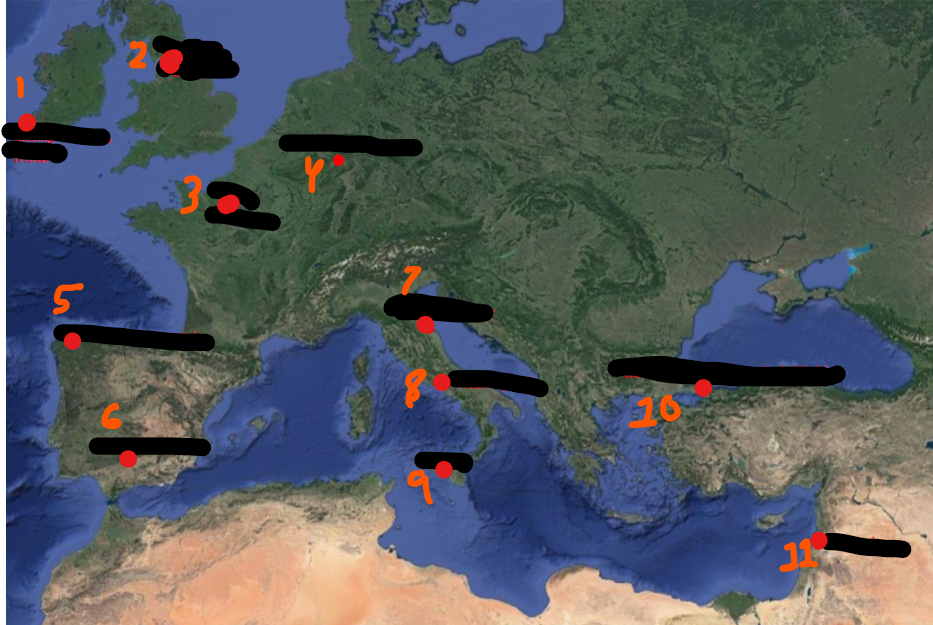
Number 1 is….
Skellig Michael, Ireland
2
New cards
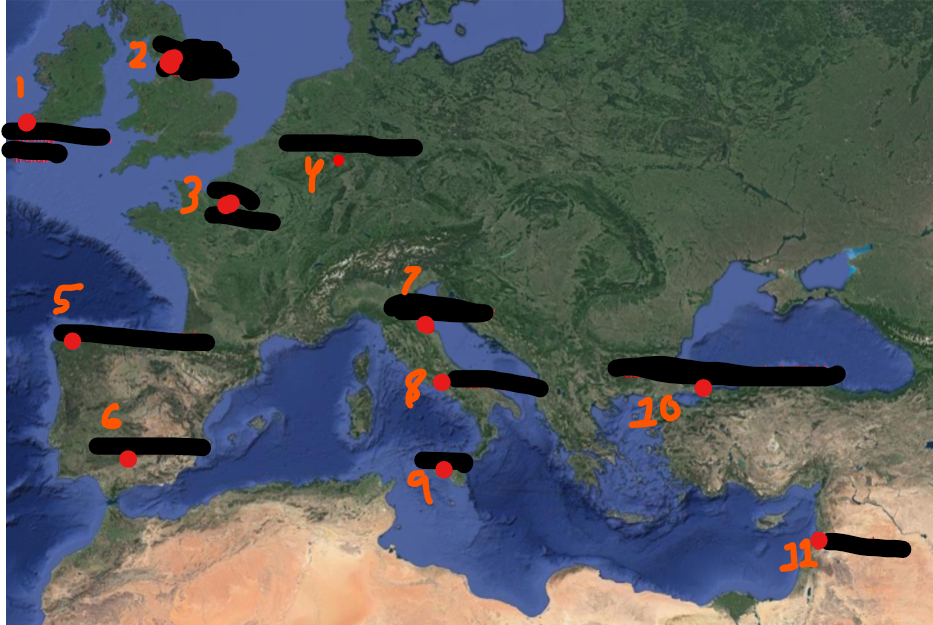
Number 2 is….
Durham, England
3
New cards
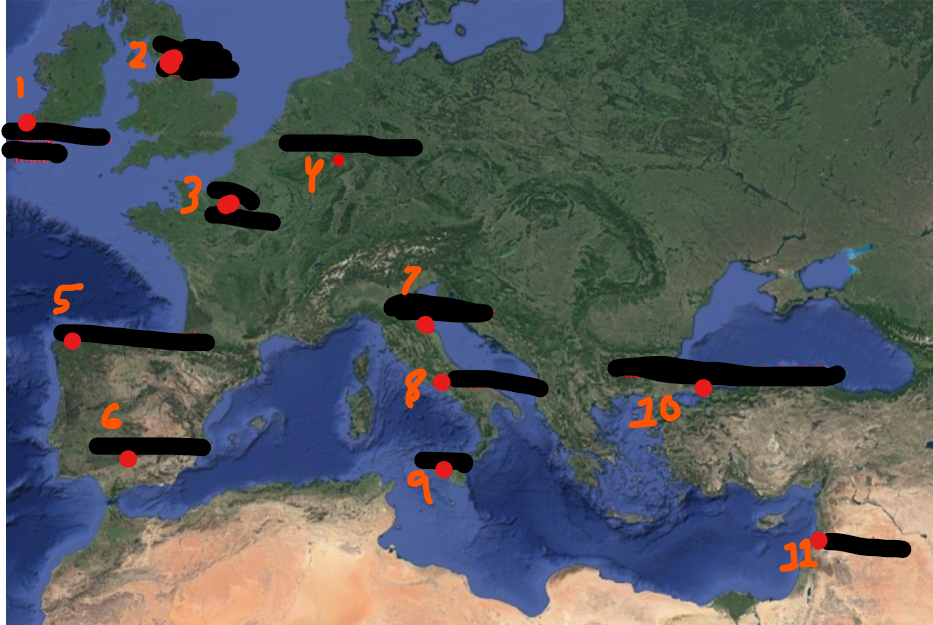
Number 3 is….
Paris, France
4
New cards
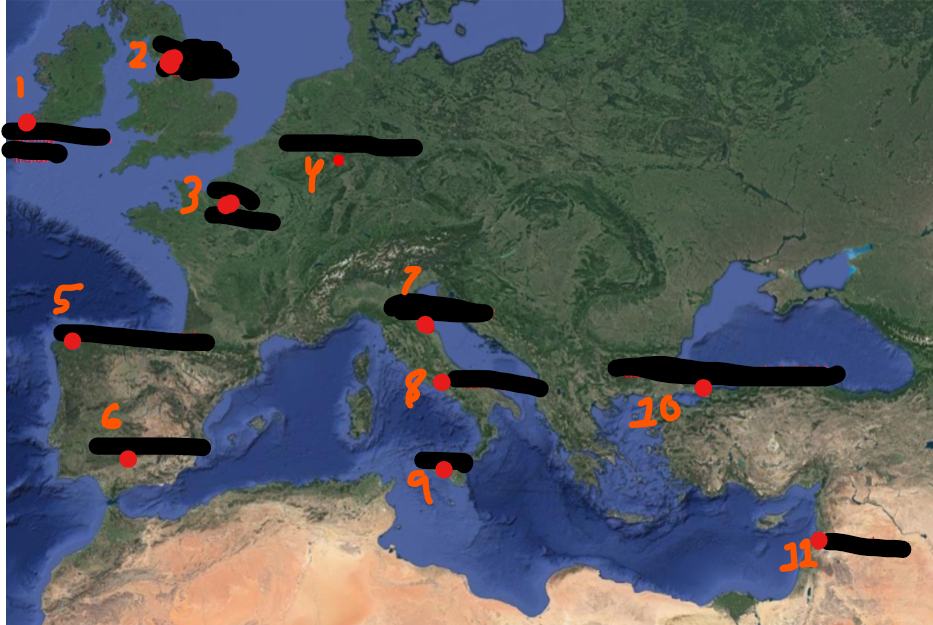
Number 4 is….
Aachen, Germany
5
New cards
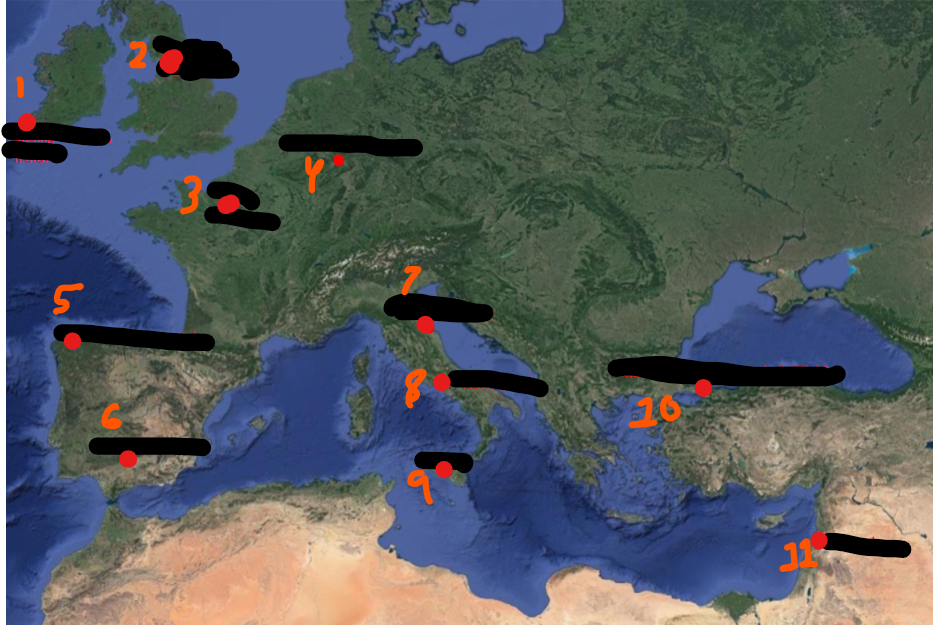
Number 5 is….
Santiago de Compostela
6
New cards
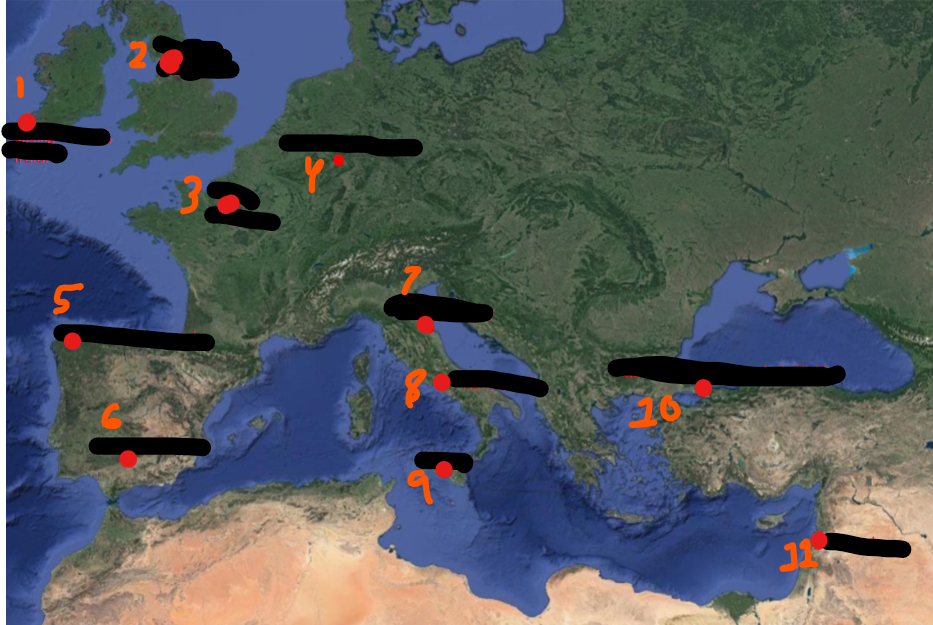
Number 6 is….
Cordoba, Spain
7
New cards
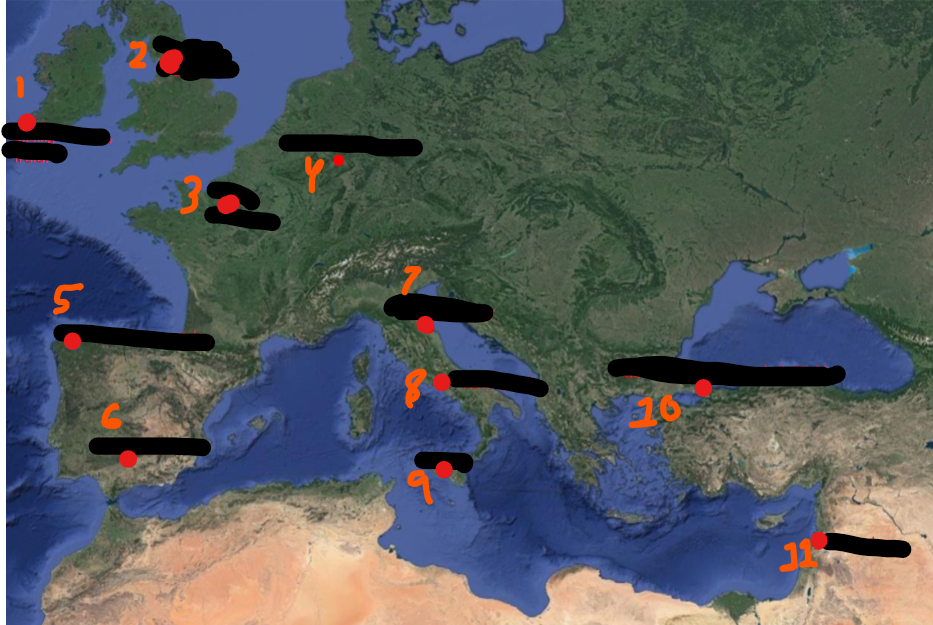
Number 7 is….
Ravenna, Italy
8
New cards
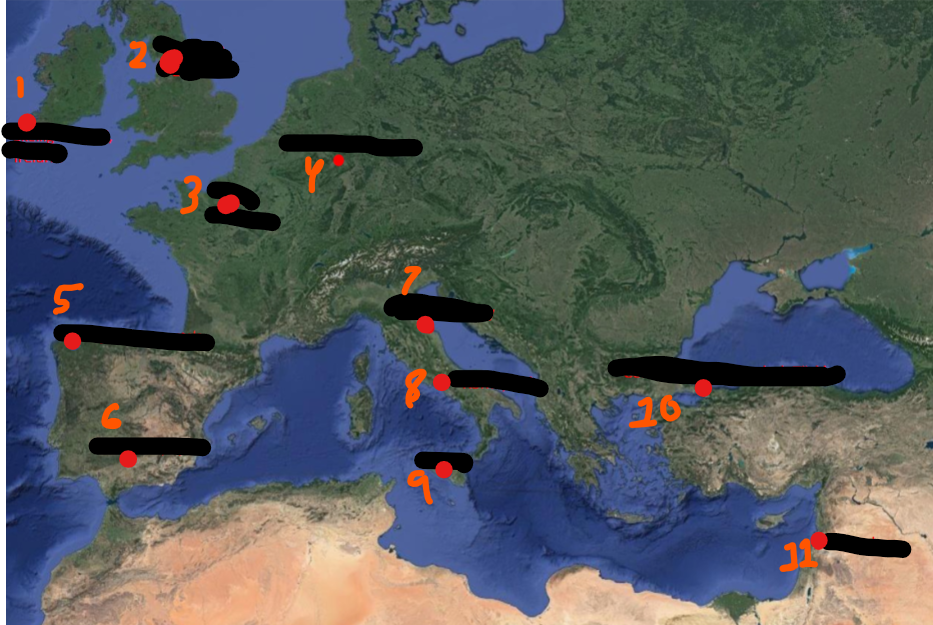
Number 8 is….
Rome, Italy
9
New cards
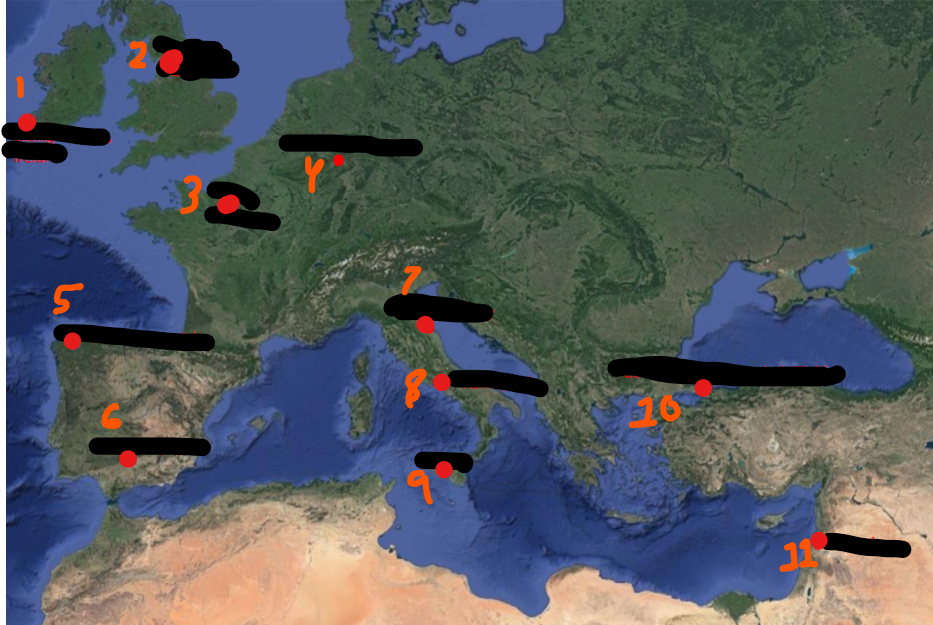
Number 9 is….
Sicily
10
New cards
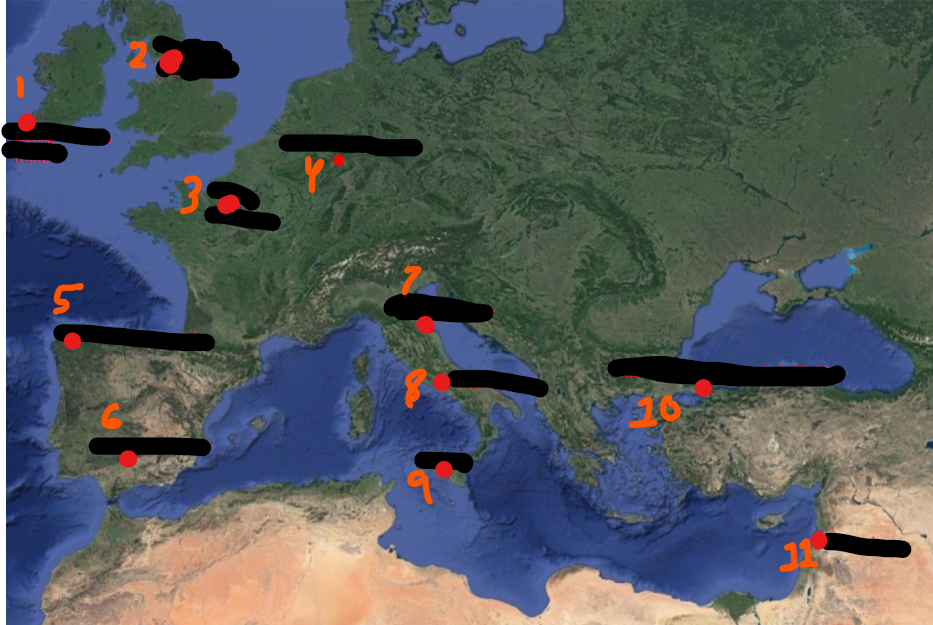
Number 10 is….
Constantinople/Istanbul, Türkiye
11
New cards
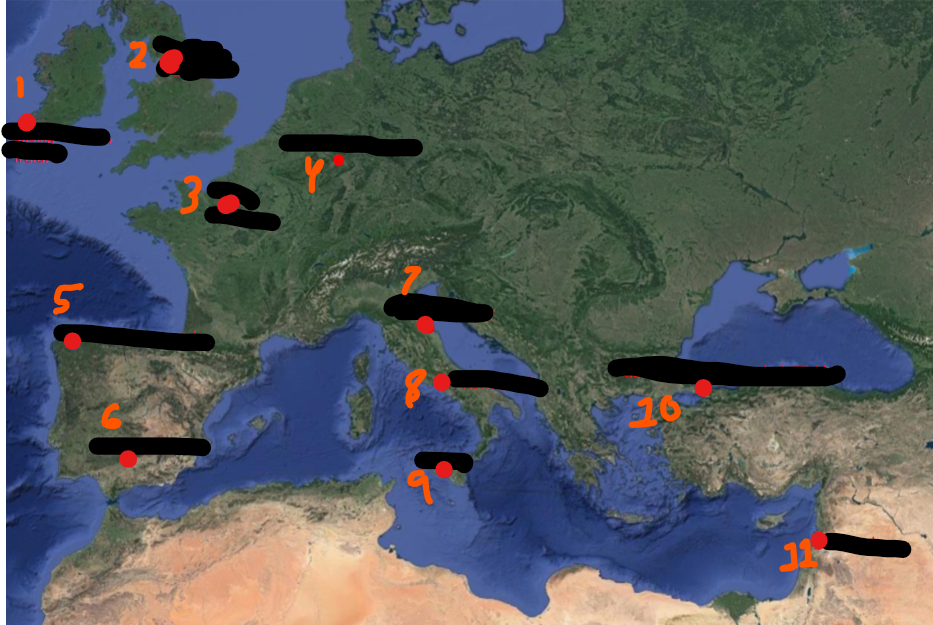
Number 11 is….
Jerusalem
12
New cards
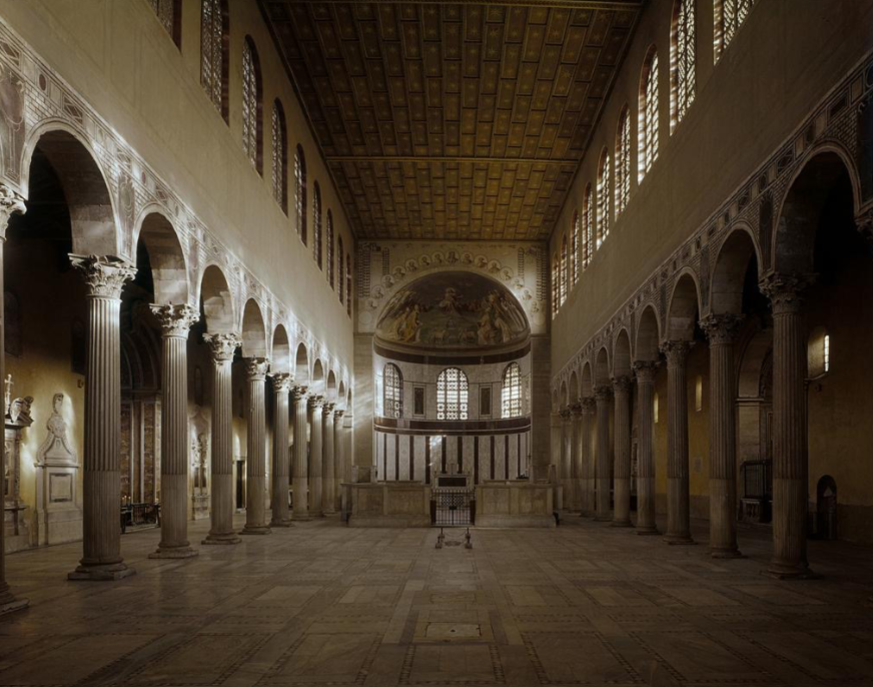
Name: Church of Santa Sabina
Date: Early Christian 200-450
Location: Rome
Patron: N/A
Significance: Has a basilica plan, flat and rectangular roof, supported by pillars
Date: Early Christian 200-450
Location: Rome
Patron: N/A
Significance: Has a basilica plan, flat and rectangular roof, supported by pillars
13
New cards
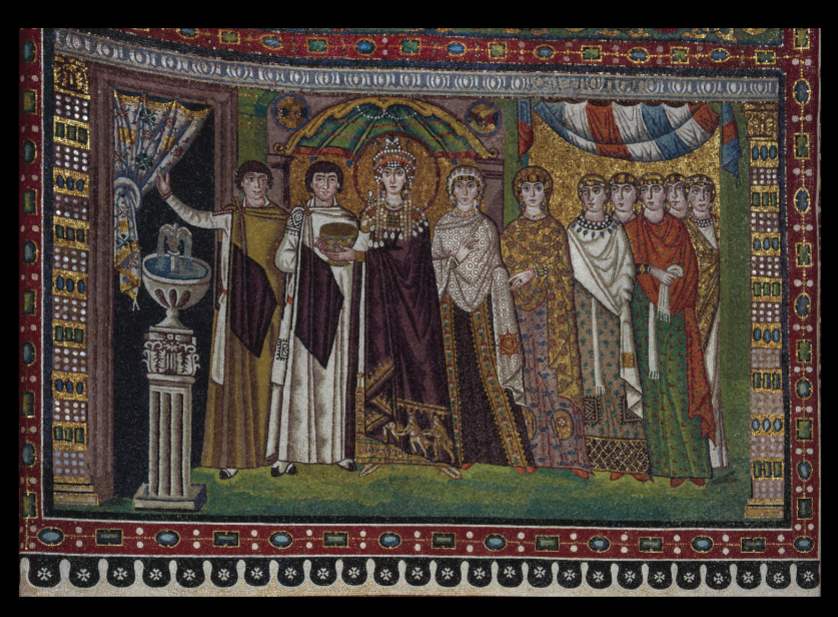
Name: Empress Theodora and her Attendants
Date: Early Byzantine 300-800
Location: Church of San Vitale, Ravenna, Italy
Patron: Justinian
Significance: Flat, 2d, same height of people
Date: Early Byzantine 300-800
Location: Church of San Vitale, Ravenna, Italy
Patron: Justinian
Significance: Flat, 2d, same height of people
14
New cards
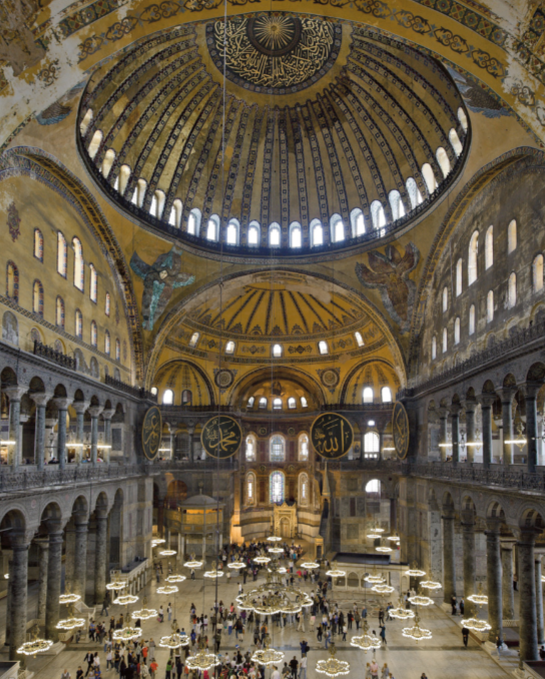
Name: Hagia Sophia
Date: Early Byzantine 300-800
Location: Constantinople
Patron: Justinian
Architects: Anthemius of Tralles and Isidore of Miletus
Significance: Has a transitional feel, from a physical to a spiritual realm. Centrally planned building and dome supported by triangular pendentives
Date: Early Byzantine 300-800
Location: Constantinople
Patron: Justinian
Architects: Anthemius of Tralles and Isidore of Miletus
Significance: Has a transitional feel, from a physical to a spiritual realm. Centrally planned building and dome supported by triangular pendentives
15
New cards
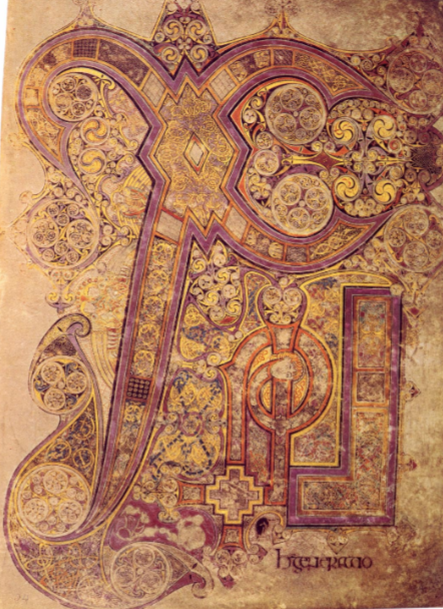
Name: Chi Rho Iota page from the Book of Kells
Date: Insular 450-650
Location: British Isles
Patron: N/A
Significance: Helped spread Christianity by relying on the images of interlace and zoomorphic art.
Date: Insular 450-650
Location: British Isles
Patron: N/A
Significance: Helped spread Christianity by relying on the images of interlace and zoomorphic art.
16
New cards
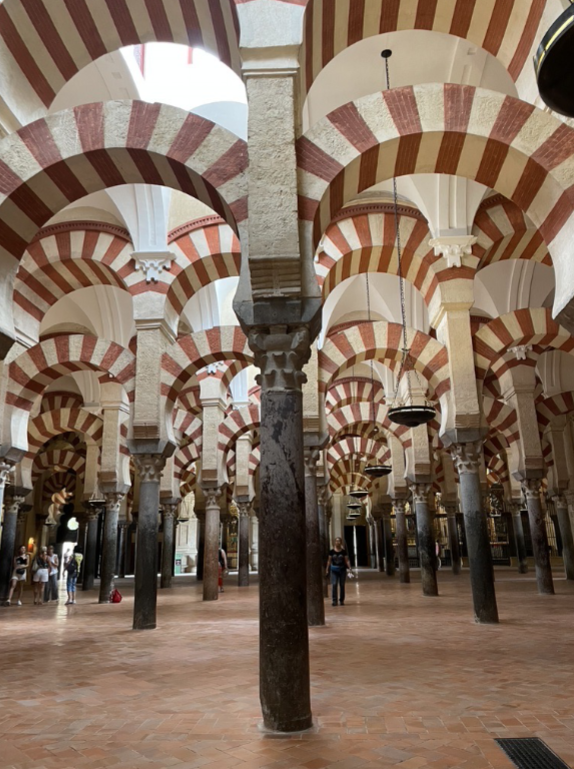
Name: Mosque of Cordoba
Date: Umayyad 650-750
Location: Cordoba, Spain
Patron: Abd al-Rahman I
Significance: Has hypostyle halls (interior space whose roof rests on pillars) and Visigothic horseshoe arches, and displays Islamic Spain’s power.
Date: Umayyad 650-750
Location: Cordoba, Spain
Patron: Abd al-Rahman I
Significance: Has hypostyle halls (interior space whose roof rests on pillars) and Visigothic horseshoe arches, and displays Islamic Spain’s power.
17
New cards
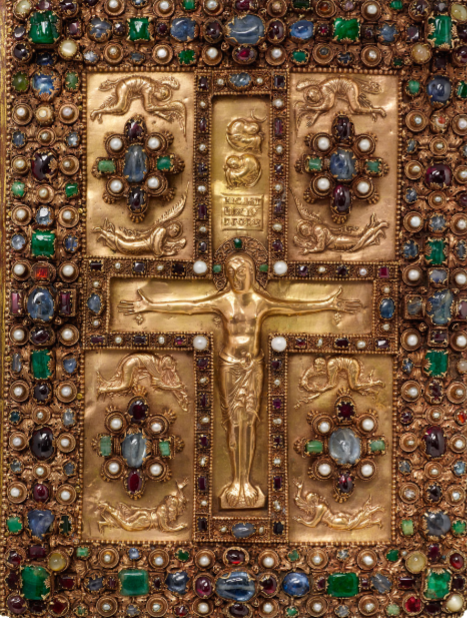
Name: Lindau Gospels
Date: Carolingian 750-900
Location: Austria??
Patron: N/A
Significance: Has a triumphant Christ on the cross. Plus the jewels show the work of filigree (__ornamental__ work of fine (typically gold or silver) wire formed into delicate tracery) and repousse ((of __metalwork__) __hammered__ into relief from the reverse side).
Date: Carolingian 750-900
Location: Austria??
Patron: N/A
Significance: Has a triumphant Christ on the cross. Plus the jewels show the work of filigree (__ornamental__ work of fine (typically gold or silver) wire formed into delicate tracery) and repousse ((of __metalwork__) __hammered__ into relief from the reverse side).
18
New cards
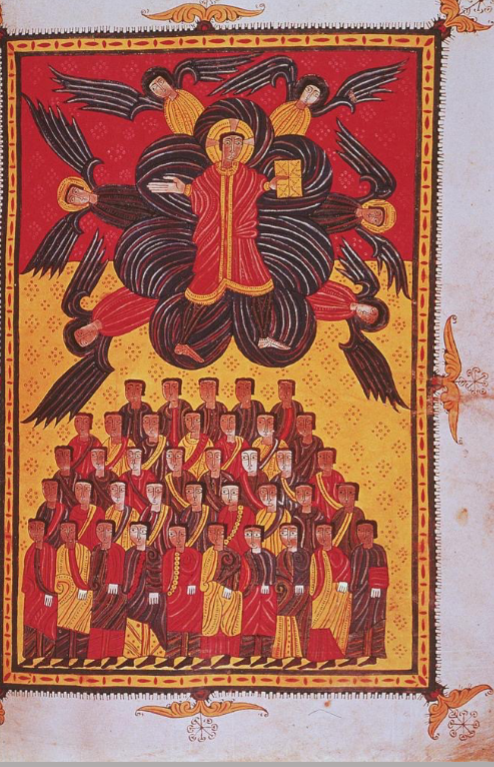
Name: Beatus of Liébana *Illustrated Commentary on the Apocalypse* “Christ Appearing in the Clouds”
Date: Romanesque 1000-1150
Location: Santo Domingo, Silos
Makers: Munnio and Dominico
Significance: Shows the 2nd coming of Christ. Has local color (flat color) and isocephaly (same height of people)
Date: Romanesque 1000-1150
Location: Santo Domingo, Silos
Makers: Munnio and Dominico
Significance: Shows the 2nd coming of Christ. Has local color (flat color) and isocephaly (same height of people)
19
New cards
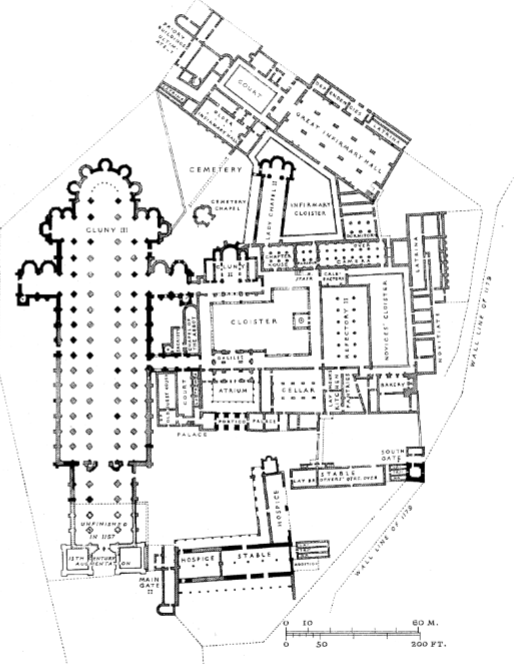
Name: Plan of the Abbey of Cluny
Date: Romanesque, c. 1000-1150
Location: Cluny, France
Patron: N/A
Significance: Depicts a basilica-like plaln. Has a double transept and radiating chapels. The largest church until St. Peters.
Date: Romanesque, c. 1000-1150
Location: Cluny, France
Patron: N/A
Significance: Depicts a basilica-like plaln. Has a double transept and radiating chapels. The largest church until St. Peters.
20
New cards
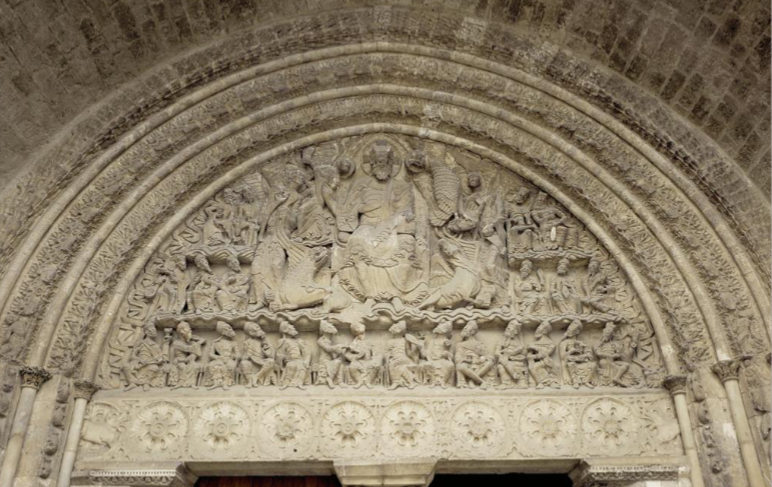
Name: Christ in Majesty
Date: Romanesque, c. 1000-1150
Location: St. Pierre, Moissac, France
Patron: N/A
Significance: On a tympanum (the semi-circular or triangular decorative wall surface over an entrance, door or window, which is bounded by a lintel and an arch) and displays a hieratic scale (scale based on relative importance).
Date: Romanesque, c. 1000-1150
Location: St. Pierre, Moissac, France
Patron: N/A
Significance: On a tympanum (the semi-circular or triangular decorative wall surface over an entrance, door or window, which is bounded by a lintel and an arch) and displays a hieratic scale (scale based on relative importance).
21
New cards
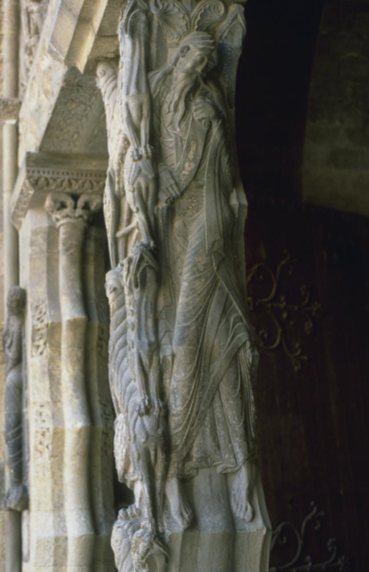
Name: Dancing Prophet/Jeremiah
Date: Romanesque, c. 1000-1150
Location: Saint-Pierre, Moissac, France
Patron:
Significance: On a trumeau (a section of wall or a __pillar__ between two openings, especially a pillar __dividing__ a large __doorway__ in a church) and shows the rise in statues (especially life sized) in churches.
Date: Romanesque, c. 1000-1150
Location: Saint-Pierre, Moissac, France
Patron:
Significance: On a trumeau (a section of wall or a __pillar__ between two openings, especially a pillar __dividing__ a large __doorway__ in a church) and shows the rise in statues (especially life sized) in churches.
22
New cards
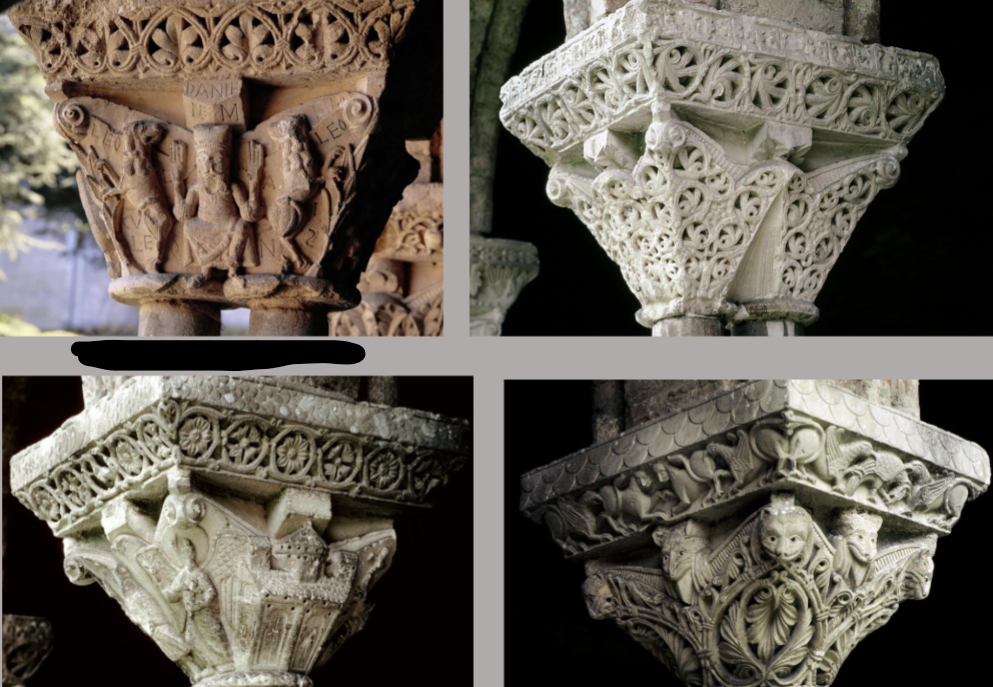
Name: Cloister Capitals
Date: Romanesque, c. 1000-1150
Location: Saint-Pierre, Moissac, France
Patron:
Significance: Top left - Daniel in the Lion’s Den and Bottom Left - The Heavenly Jerusalem shown. Depicts how capitals are all different and tell stories of the bible so the illiterate can convert.
Date: Romanesque, c. 1000-1150
Location: Saint-Pierre, Moissac, France
Patron:
Significance: Top left - Daniel in the Lion’s Den and Bottom Left - The Heavenly Jerusalem shown. Depicts how capitals are all different and tell stories of the bible so the illiterate can convert.
23
New cards
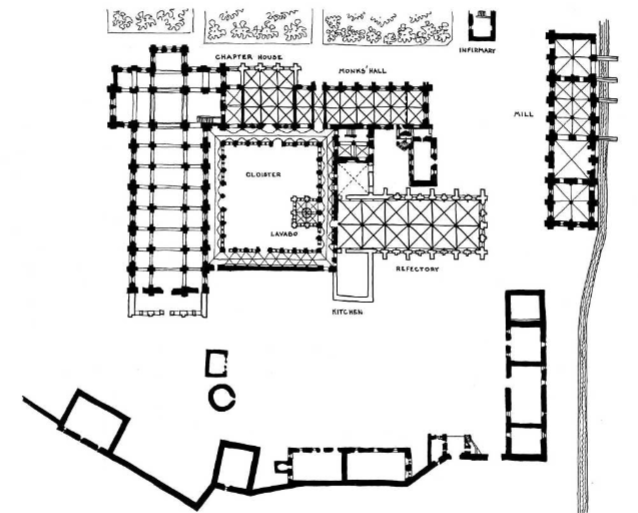
Name: Cistercian “Bernardine” Plan of an ideal monastery
Date: Romanesque, c. 1000-1150
Location: N/A
Patron: St. Bernard of Clairvaux
Significance: There is little to no decoration in the building’s plan.
Date: Romanesque, c. 1000-1150
Location: N/A
Patron: St. Bernard of Clairvaux
Significance: There is little to no decoration in the building’s plan.
24
New cards
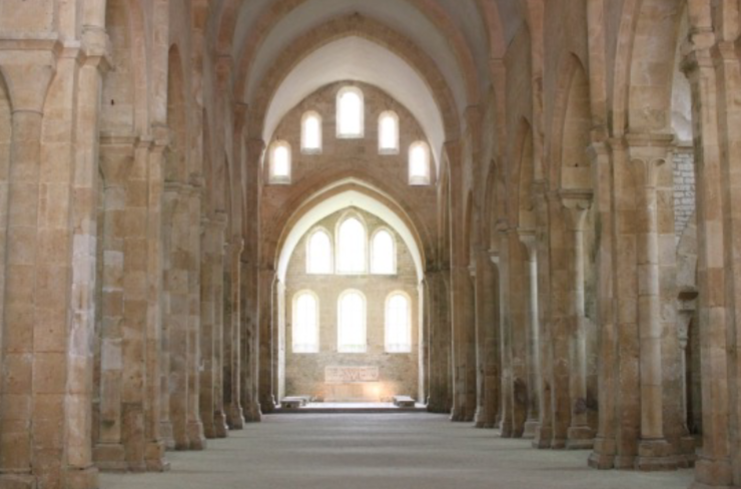
Name: Fontenay Abbey Church
Date: Romanesque, c. 1000-1150
Location: Burgundy, France
Patron: St. Bernard of Clairvaux
Significance: No decoration in order for there to be no temptation to be lazy in viewing decorations. Thick pillars.
Date: Romanesque, c. 1000-1150
Location: Burgundy, France
Patron: St. Bernard of Clairvaux
Significance: No decoration in order for there to be no temptation to be lazy in viewing decorations. Thick pillars.
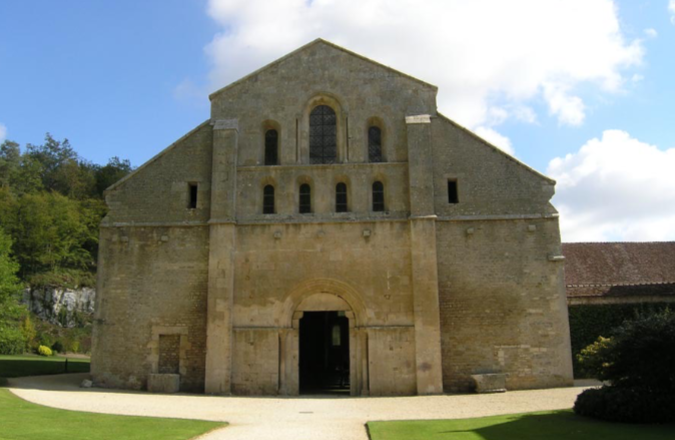
25
New cards
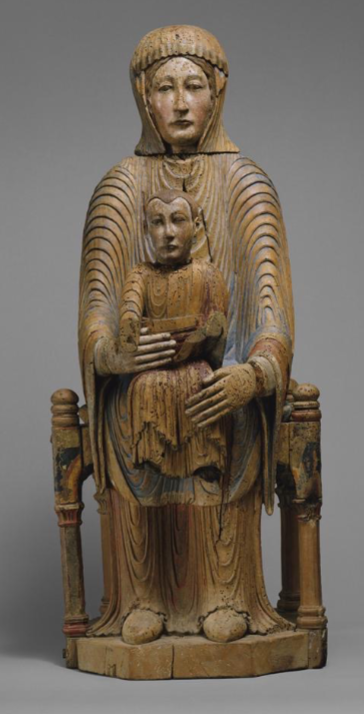
Name: Virgin and Child
Date: Romanesque, c. 1000-1150
Location: Made in France moved to The Cloisters, Metropolitan Museum of Art in New York City
Patron: N/A
Significance: Sedes sapientiae/Throne of Wisdom (presents Mary as the bearer of God via her role as the mother of Christ, transforming Mary into an actual throne for Christ). Mary is stiff as she is the throne and Jesus looks older to encapsulate wisdom.
Date: Romanesque, c. 1000-1150
Location: Made in France moved to The Cloisters, Metropolitan Museum of Art in New York City
Patron: N/A
Significance: Sedes sapientiae/Throne of Wisdom (presents Mary as the bearer of God via her role as the mother of Christ, transforming Mary into an actual throne for Christ). Mary is stiff as she is the throne and Jesus looks older to encapsulate wisdom.
26
New cards
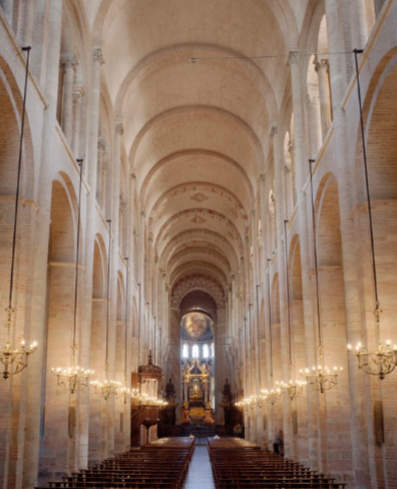
Name: Basilica of Saint-Sernin
Date: Romanesque 1000-1150
Location: Toulouse, France
Architect: Eugène Viollet-le-Duc
Significance: Elevation: Two levels: Nave arcade and the Gallery. Has Round arches, Barrel vault, Transverse arch, and a Bay unit
Date: Romanesque 1000-1150
Location: Toulouse, France
Architect: Eugène Viollet-le-Duc
Significance: Elevation: Two levels: Nave arcade and the Gallery. Has Round arches, Barrel vault, Transverse arch, and a Bay unit
27
New cards
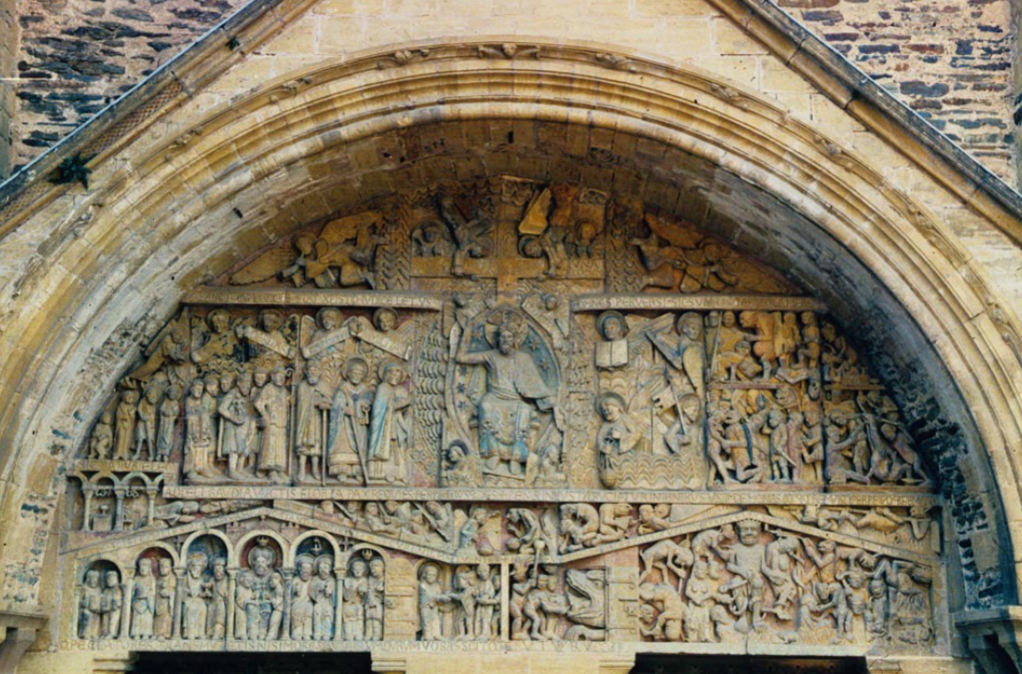
Name: Sainte-Foy Tympanum
Date: Romanesque, c. 1000-1150
Location: Conques, France
Patron: N/A
Significance: Shows the last judgment that Christ presides over. The left shows heavenly good, while the right shows damnation of souls.
Date: Romanesque, c. 1000-1150
Location: Conques, France
Patron: N/A
Significance: Shows the last judgment that Christ presides over. The left shows heavenly good, while the right shows damnation of souls.
28
New cards
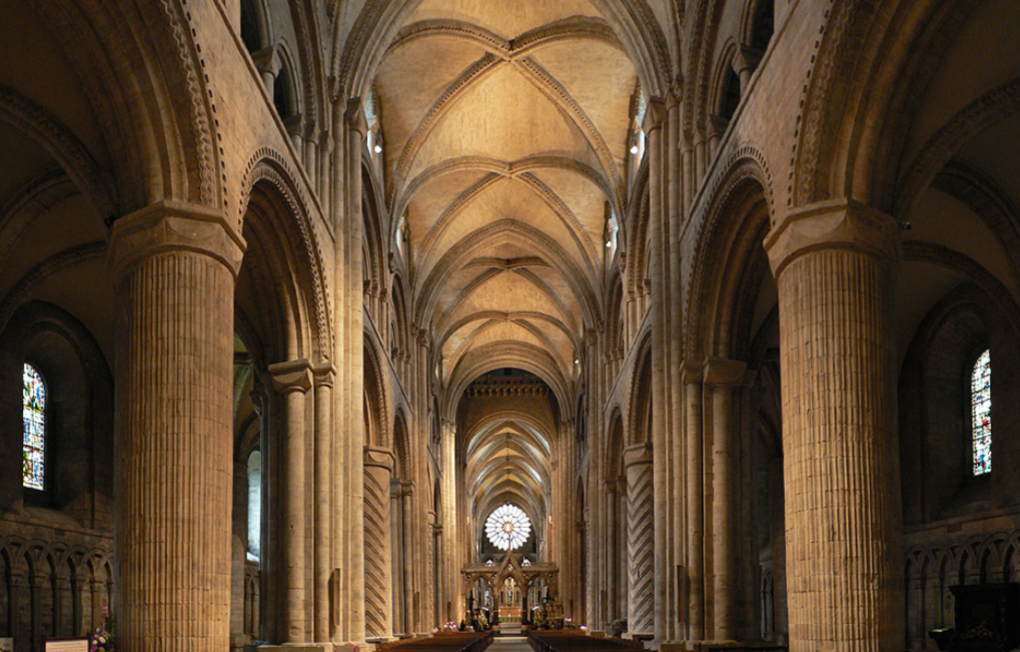
Name: Durham Cathedral
Date: Norman Romanesque, c. 1066- c. 1170
Location: Durham, England
Patron: Bishop William of Calais (from Normandy)
Significance: A transverse arch and two nave arches for each bay.
Date: Norman Romanesque, c. 1066- c. 1170
Location: Durham, England
Patron: Bishop William of Calais (from Normandy)
Significance: A transverse arch and two nave arches for each bay.
29
New cards

Name: Bayeux Tapestry
Date: Norman Romanesque, c. 1066- c. 1170
Location: Westminster Abbey, England
Patron: N/A
Significance: Depicts the events leading up to the Norman Conquest of England in 1066, led by William, Duke of Normandy challenging Harold II, King of England, and culminating in the Battle of Hastings.
Date: Norman Romanesque, c. 1066- c. 1170
Location: Westminster Abbey, England
Patron: N/A
Significance: Depicts the events leading up to the Norman Conquest of England in 1066, led by William, Duke of Normandy challenging Harold II, King of England, and culminating in the Battle of Hastings.
30
New cards
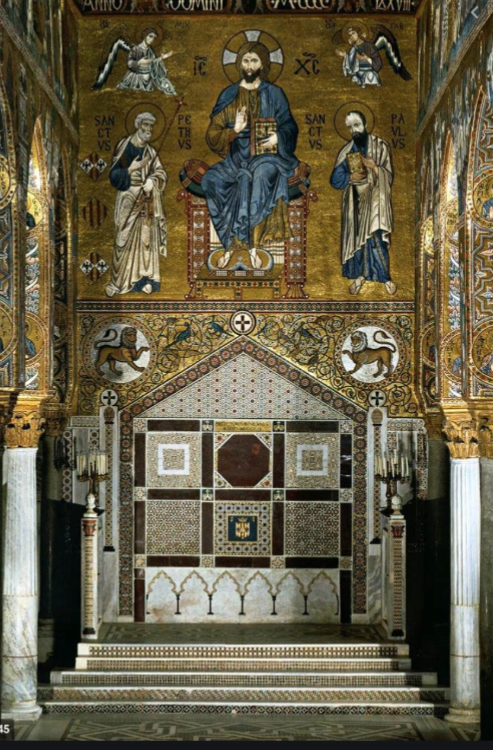
Name: Raised Throne of Roger II
Date: Norman Romanesque, c. 1066- c. 1170
Location: Cappella Palatina Palermo (Palatine Chapel), Sicily
Patron:
Significance: Shows Christ and 2 apostles over the throne, showcasing their approval of the ruler.
Date: Norman Romanesque, c. 1066- c. 1170
Location: Cappella Palatina Palermo (Palatine Chapel), Sicily
Patron:
Significance: Shows Christ and 2 apostles over the throne, showcasing their approval of the ruler.
31
New cards
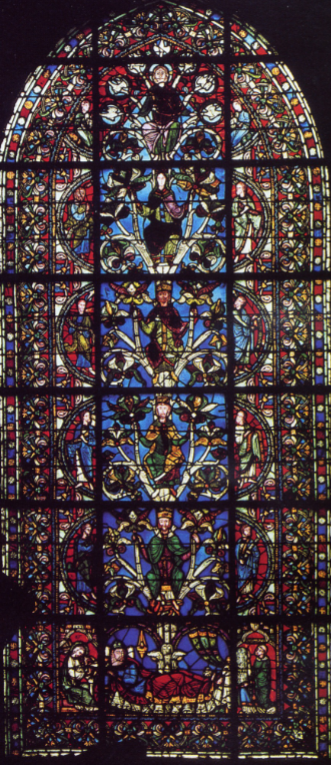
Name: Tree of Jesse window
Date: Gothic, c. 1140-1450
Location: Abbey Church of Saint-Denis (near Paris), France
Patron:
Significance:
Date: Gothic, c. 1140-1450
Location: Abbey Church of Saint-Denis (near Paris), France
Patron:
Significance:
32
New cards
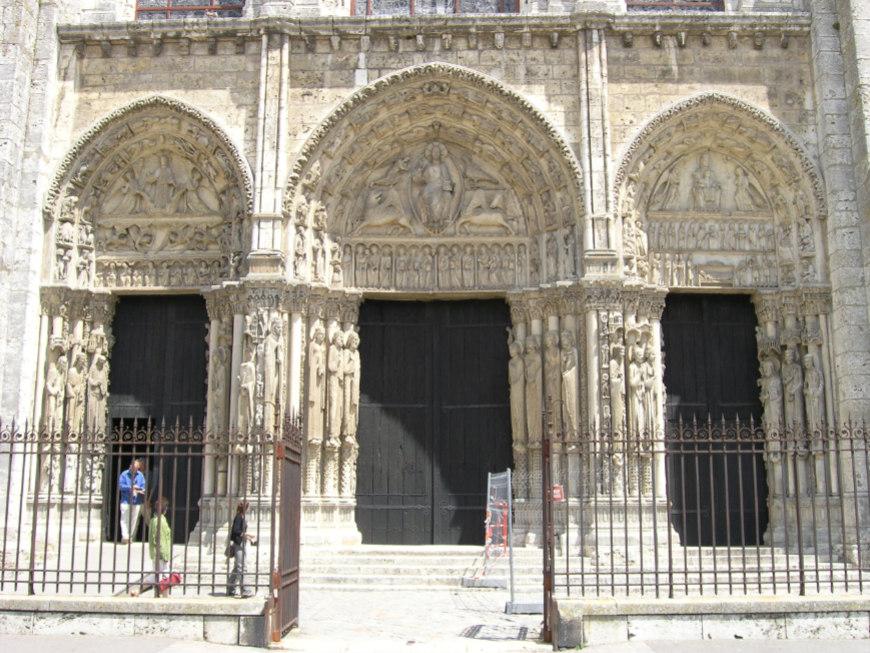
Name: Royal Portal
Date: Gothic, c. 1140-1450
Location: Notre-Dame de Chartres, France,
Patron:
Significance:
Date: Gothic, c. 1140-1450
Location: Notre-Dame de Chartres, France,
Patron:
Significance:
33
New cards
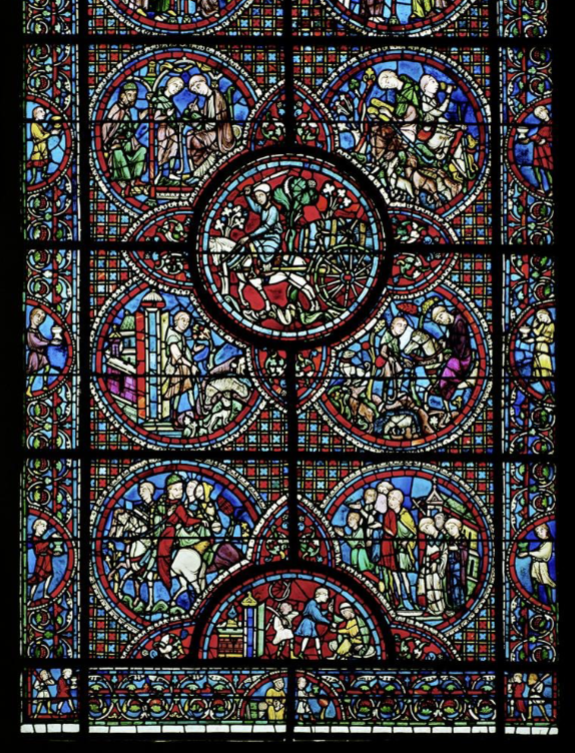
Name: St. Lubinus Window
Date: Gothic, c. 1140-1450
Location: Window of the Trades, Chartres Cathedral
Patron: N/A
Significance: Most complete set of stained glass windows that still exists from medieval cathedrals. Has amplificatio, amplifies something by its repetition. Much color.
Date: Gothic, c. 1140-1450
Location: Window of the Trades, Chartres Cathedral
Patron: N/A
Significance: Most complete set of stained glass windows that still exists from medieval cathedrals. Has amplificatio, amplifies something by its repetition. Much color.
34
New cards
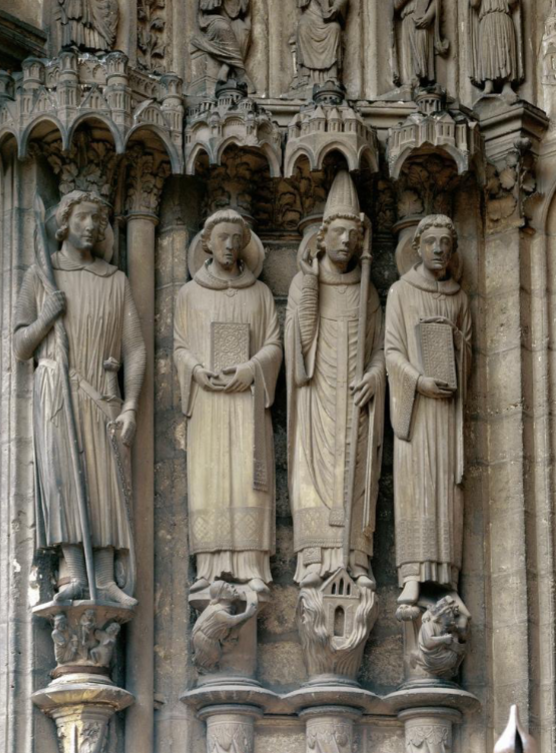
Name: Notre-Dame de Chartres - South Transept \\n Portal - Martyr’s portal
Date: Gothic, c. 1140-1450
Location: Chartres, France
Patron: N/A
Significance: Has Saint Theodore, Saint Stephen, Pope Clement, and Saint Lawrence depicted. Life sized.
Date: Gothic, c. 1140-1450
Location: Chartres, France
Patron: N/A
Significance: Has Saint Theodore, Saint Stephen, Pope Clement, and Saint Lawrence depicted. Life sized.
35
New cards
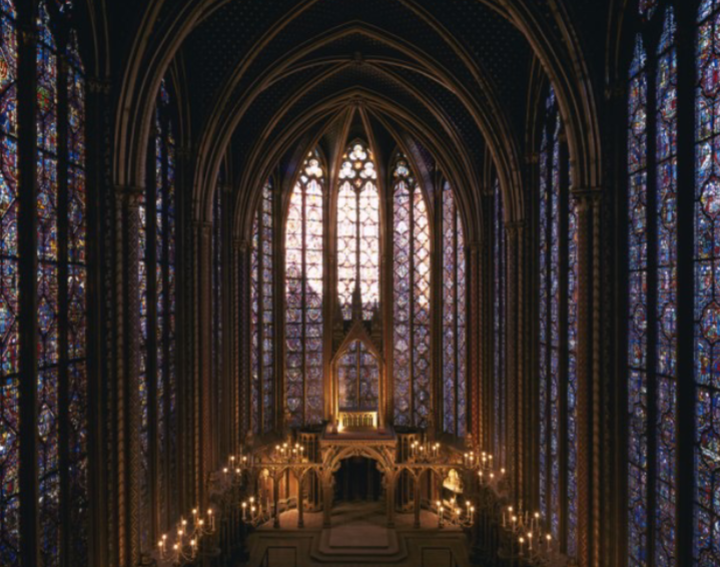
Name: Sainte-Chapelle
Date: Gothic, c. 1140-1450
Location: Paris, France
Patron: N/A
Significance: Walls are made up of stained glass. Has many pointed arches.
Date: Gothic, c. 1140-1450
Location: Paris, France
Patron: N/A
Significance: Walls are made up of stained glass. Has many pointed arches.
36
New cards
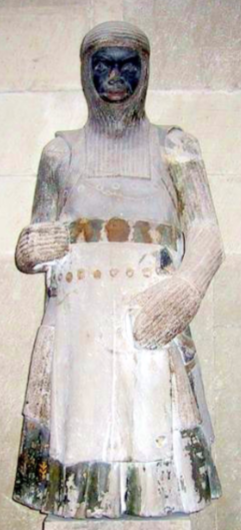
Name: St. Maurice
Date: Gothic, c. 1140-1450
Location: Cathedral of Saints Maurice and Catherine in Magdeburg, Germany
Patron: N/A
Significance: Having a previously white European saint be suddenly portrayed as a black African. This continued and is acknowledged in a positive light. A martyr, a saint and chivalrous warrior who has his own Roman holiday.
Date: Gothic, c. 1140-1450
Location: Cathedral of Saints Maurice and Catherine in Magdeburg, Germany
Patron: N/A
Significance: Having a previously white European saint be suddenly portrayed as a black African. This continued and is acknowledged in a positive light. A martyr, a saint and chivalrous warrior who has his own Roman holiday.
37
New cards
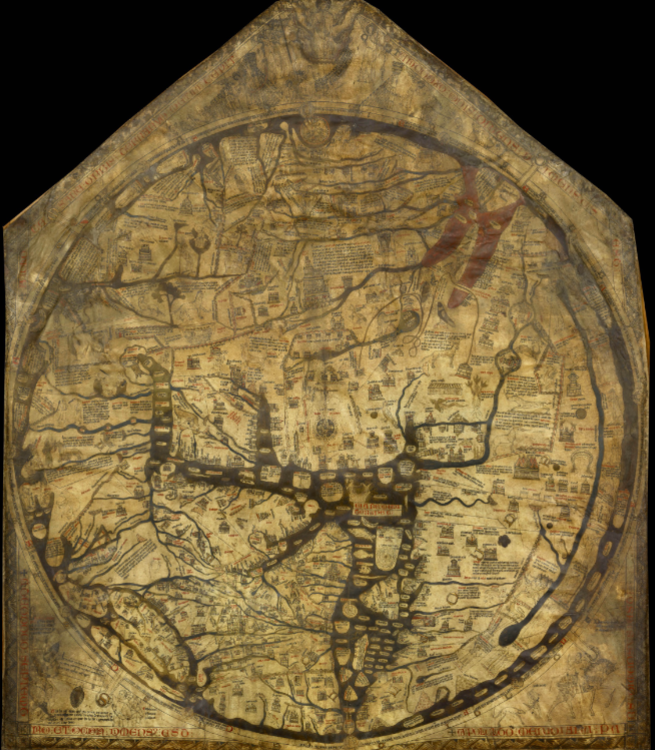
Name: The Hereford World Map, “Mappa Mundi”
Date: Gothic, c. 1140-1450
Location: England
Patron:
Significance: T-O Map (Medieval geography divided the world into three schematic parts: Asia, Europe, and Africa. Asia was depicted on top as the birthplace of Christ and the original site of the Garden of Eden).
Date: Gothic, c. 1140-1450
Location: England
Patron:
Significance: T-O Map (Medieval geography divided the world into three schematic parts: Asia, Europe, and Africa. Asia was depicted on top as the birthplace of Christ and the original site of the Garden of Eden).
38
New cards
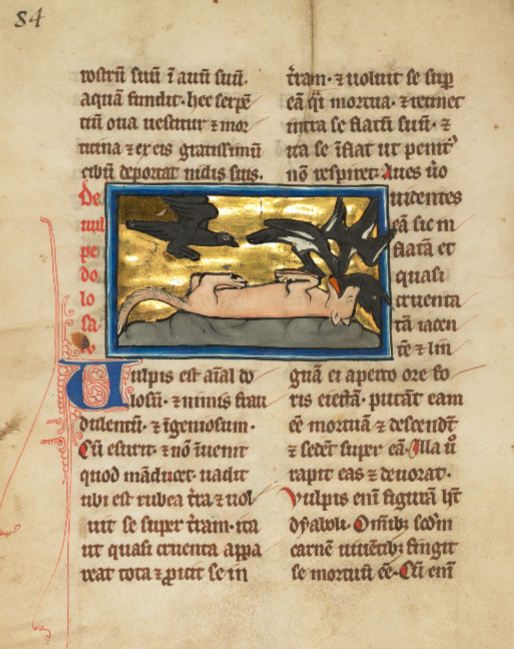
Name: Fox from Hugh of Fouilloy and William of Conches Bestiary
Date: Gothic 1140-1450
Location: Getty
Patron: N/A
Significance: The bestiary describes the fox as the devil, who pretends to be dead to those not committed to Christ. The unfaithful learn his true nature only when it is too late, and the devil already has them within his jaws. The moral? The devil is truly dead only to those with an unconditional commitment to God.
Date: Gothic 1140-1450
Location: Getty
Patron: N/A
Significance: The bestiary describes the fox as the devil, who pretends to be dead to those not committed to Christ. The unfaithful learn his true nature only when it is too late, and the devil already has them within his jaws. The moral? The devil is truly dead only to those with an unconditional commitment to God.
39
New cards
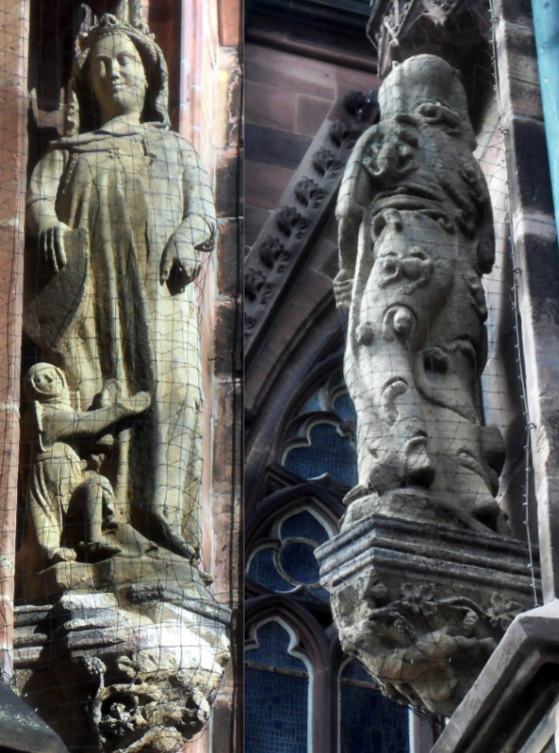
Name: “Lady World”
Date: Gothic, c. 1140-1450
Location: Worms Cathedral South Portal
Patron: N/A
Significance: Might have come from Konrad von Würtzburg (the chief German poet), in “The World’s Reward” (Folktales Told by Five Scandinavian Storytellers)??
Date: Gothic, c. 1140-1450
Location: Worms Cathedral South Portal
Patron: N/A
Significance: Might have come from Konrad von Würtzburg (the chief German poet), in “The World’s Reward” (Folktales Told by Five Scandinavian Storytellers)??
40
New cards
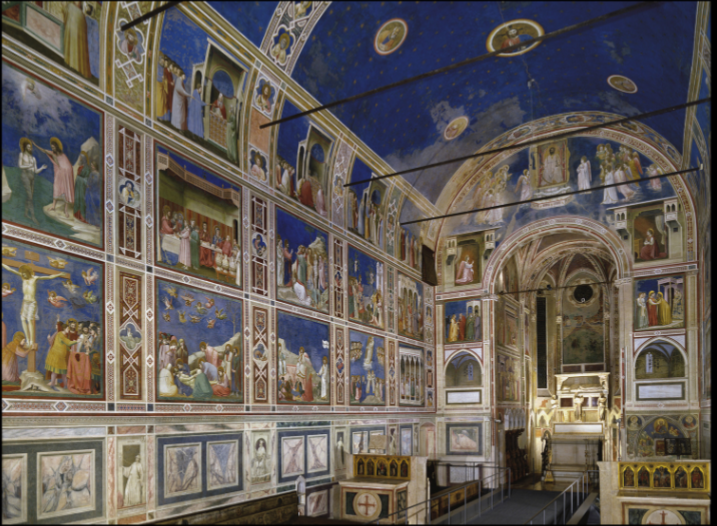
Name: Scrovegni Arena Chapel
Date: Gothic, c. 1140-1450
Location: Padua, Italy
Painter: Giotto
Significance: Paintings do not follow the gospel to the exact. Instead focuses on telling stories of Mary and Christ as a family.
Date: Gothic, c. 1140-1450
Location: Padua, Italy
Painter: Giotto
Significance: Paintings do not follow the gospel to the exact. Instead focuses on telling stories of Mary and Christ as a family.
41
New cards
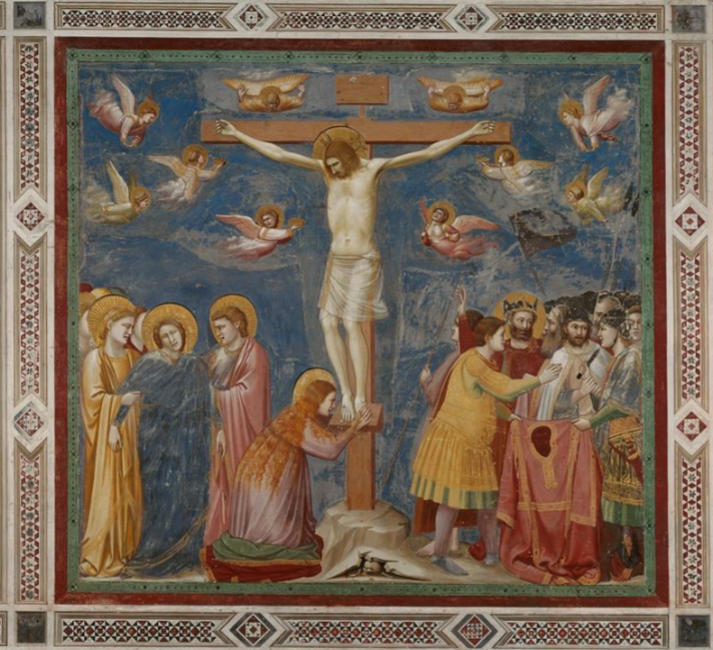
Name: *Crucifixion*
Date: Gothic 1140-1450
Location: Arena Chapel, Padua, Italy
Painter: Giotto
Significance: Very naturalistic, no idealization or elongation, just precise clothing, real facial features and forms that one could connect with in real life. The foreground is then separated into two, with mourners to the left and soldiers the right. Mary Magdalene, one of his followers, would kneel by his side, in desperate sadness.
Date: Gothic 1140-1450
Location: Arena Chapel, Padua, Italy
Painter: Giotto
Significance: Very naturalistic, no idealization or elongation, just precise clothing, real facial features and forms that one could connect with in real life. The foreground is then separated into two, with mourners to the left and soldiers the right. Mary Magdalene, one of his followers, would kneel by his side, in desperate sadness.
42
New cards
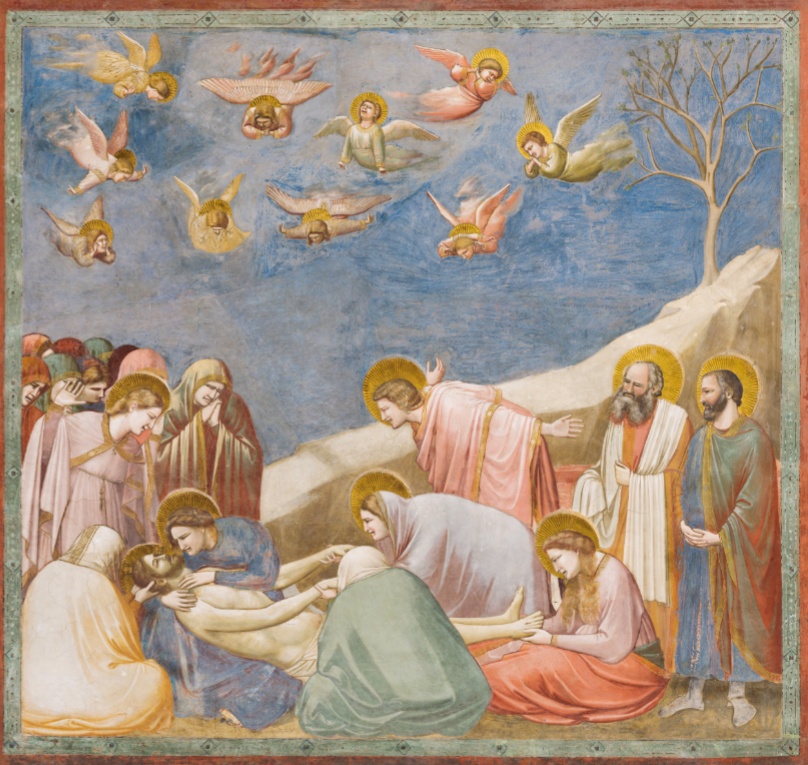
Name: *Lamentation*
Date: 1140-1450
Location: Arena Chapel, Padua, Italy
Painter: Giotto
Significance: Depicts the lamentation over Christ's dead body as a model for the viewer's own contemplation and empathy. The figures lifting Christ's shroud, Joseph of Arimathea and Nicodemus, stand out in their contemporary attire, offering a bridge to the viewer's own time.
Date: 1140-1450
Location: Arena Chapel, Padua, Italy
Painter: Giotto
Significance: Depicts the lamentation over Christ's dead body as a model for the viewer's own contemplation and empathy. The figures lifting Christ's shroud, Joseph of Arimathea and Nicodemus, stand out in their contemporary attire, offering a bridge to the viewer's own time.
43
New cards
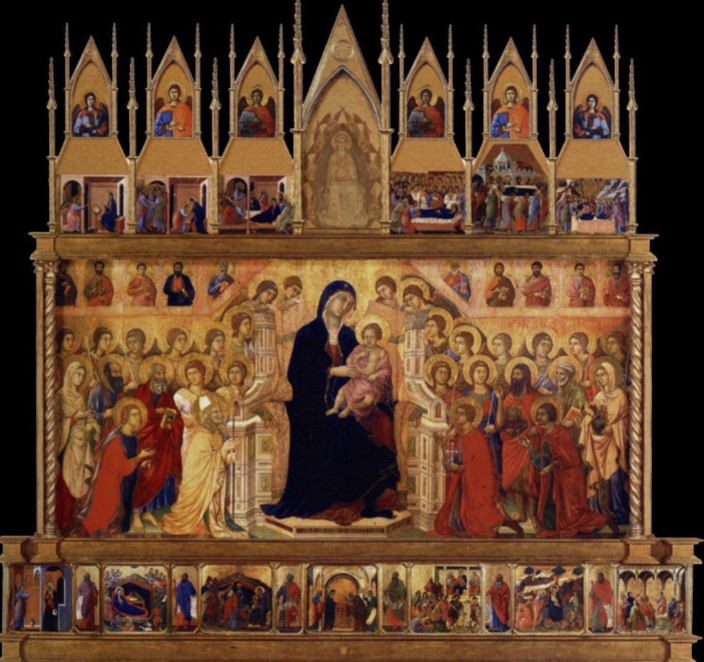
Name: Maestà
Date: Gothic, c. 1140-1450
Location: Duomo di Siena (Siena Cathedral in Siena, Italy)
Painter: Duccio di Buoninsegna
Significance: Compressed within the compass of an altarpiece is the equivalent of an entire programme for the fresco painting of a church
Date: Gothic, c. 1140-1450
Location: Duomo di Siena (Siena Cathedral in Siena, Italy)
Painter: Duccio di Buoninsegna
Significance: Compressed within the compass of an altarpiece is the equivalent of an entire programme for the fresco painting of a church
44
New cards
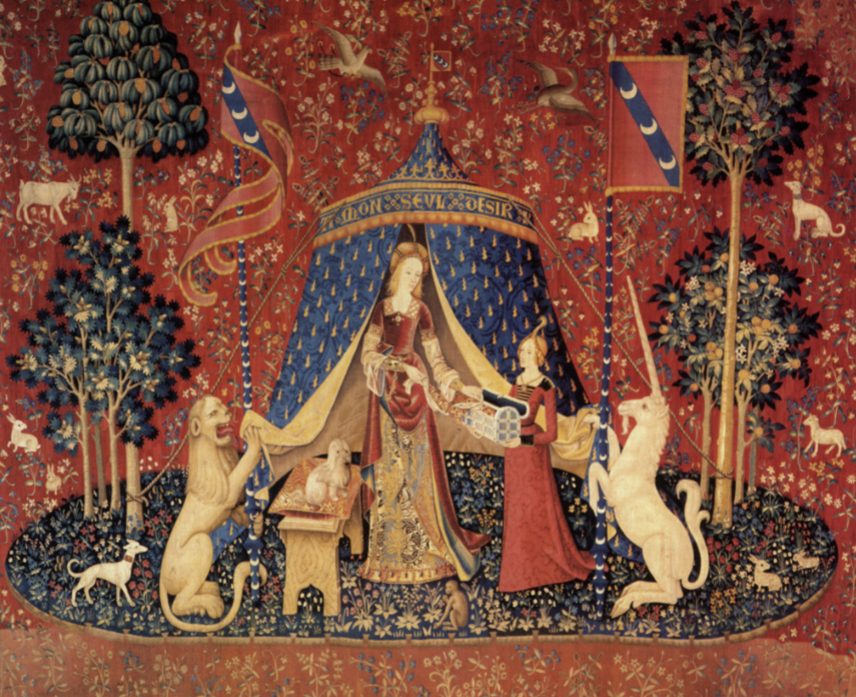
Name: A mon seul desir (To my only desire)
Date: Gothic, c. 1140-1450
Location: Musée national du Moyen-Âge—Thermes de Cluny (Paris) / National Museum of the Middle Ages—Thermes de Cluny (Paris)
Patron: N/A
Significance: Symmetrical-like, we are seen as a viewer. One tall woman and the other short, to show importance. The Lady is seen placing her jeweled necklace into a jewel box, and it is believed to represent the refusal of temptation, as well as the self-denial of the five senses detailed in the other works in the series
Date: Gothic, c. 1140-1450
Location: Musée national du Moyen-Âge—Thermes de Cluny (Paris) / National Museum of the Middle Ages—Thermes de Cluny (Paris)
Patron: N/A
Significance: Symmetrical-like, we are seen as a viewer. One tall woman and the other short, to show importance. The Lady is seen placing her jeweled necklace into a jewel box, and it is believed to represent the refusal of temptation, as well as the self-denial of the five senses detailed in the other works in the series
45
New cards
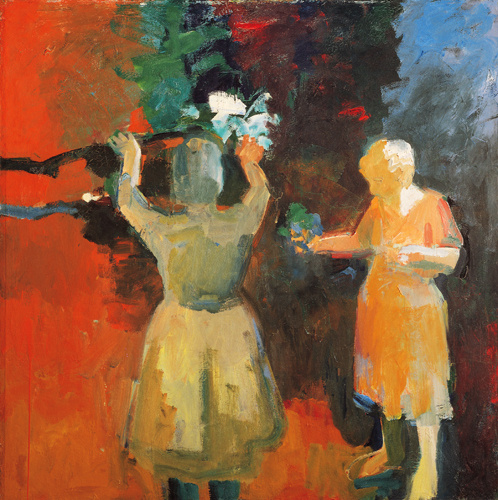
This is an example of….
Local Color:
the natural color of an object in ordinary daylight (aka the base color)
the natural color of an object in ordinary daylight (aka the base color)
46
New cards
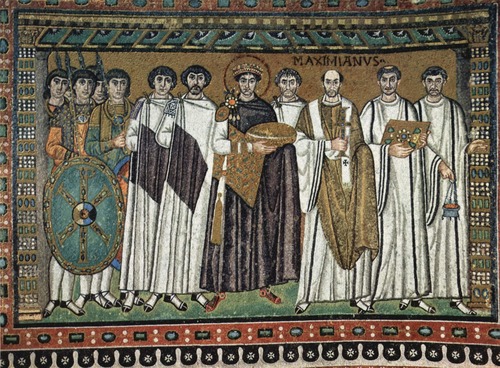
This is an example of….
Isocephaly:
having the heads of the figures in a composition brought to the same level
having the heads of the figures in a composition brought to the same level
47
New cards
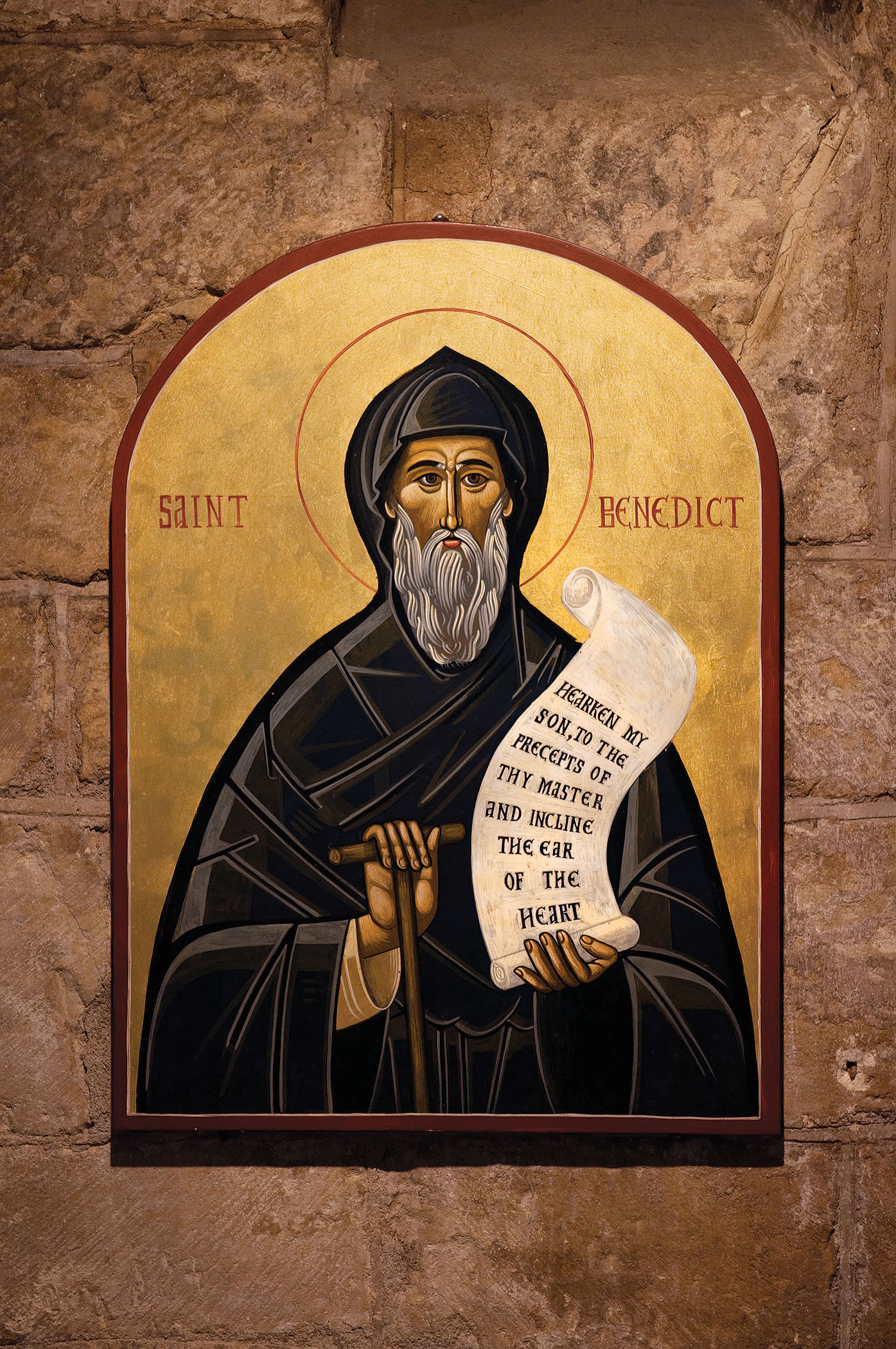
This is an example of a….
Benedictine:
officially the Order of Saint Benedict, are a monastic religious order of the Catholic Church following the Rule of Saint Benedict. They are also sometimes called the **Black Monks**.
officially the Order of Saint Benedict, are a monastic religious order of the Catholic Church following the Rule of Saint Benedict. They are also sometimes called the **Black Monks**.
48
New cards
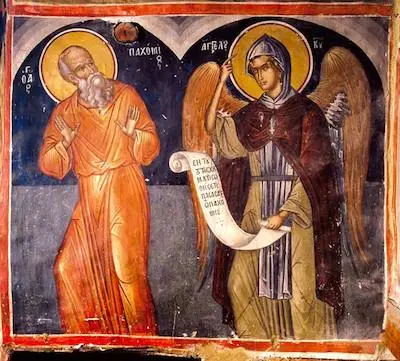
This is an example of a….
Cenobitic:
form of monasticism based on “life in common” (Greek koinobion), characterized by strict discipline, regular worship, and manual work
form of monasticism based on “life in common” (Greek koinobion), characterized by strict discipline, regular worship, and manual work
49
New cards
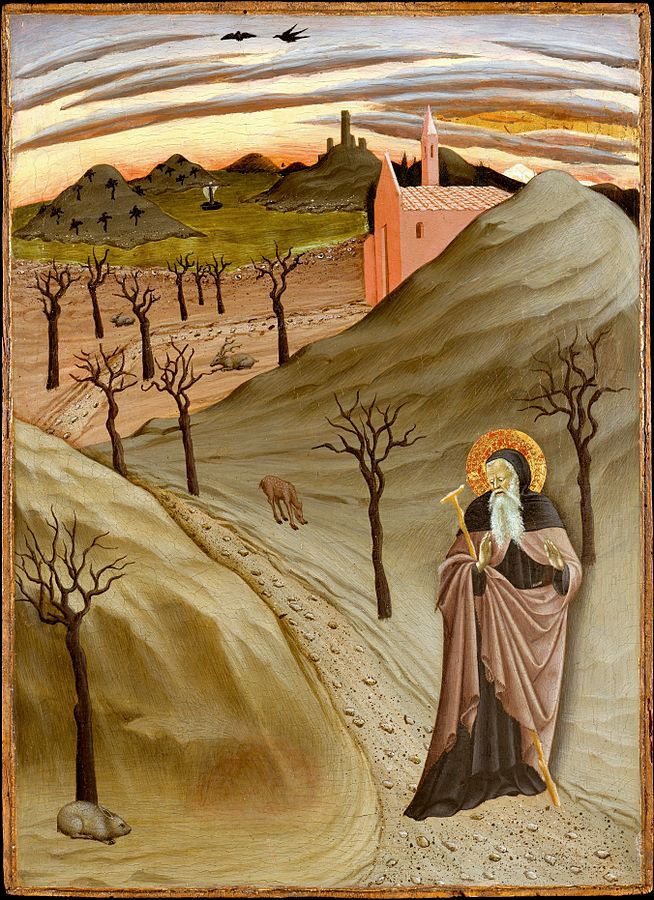
This is an example of an….
Eremitic:
one who retires from society, primarily for religious reasons, and lives in solitude
one who retires from society, primarily for religious reasons, and lives in solitude
50
New cards
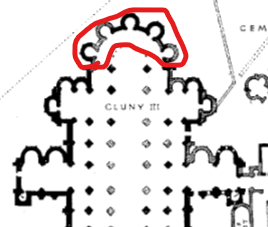
This is an example of a….
Radiating chapel:
projecting chapels arranged radially around the ambulatory of a semicircular or polygonal liturgical east end
projecting chapels arranged radially around the ambulatory of a semicircular or polygonal liturgical east end
51
New cards
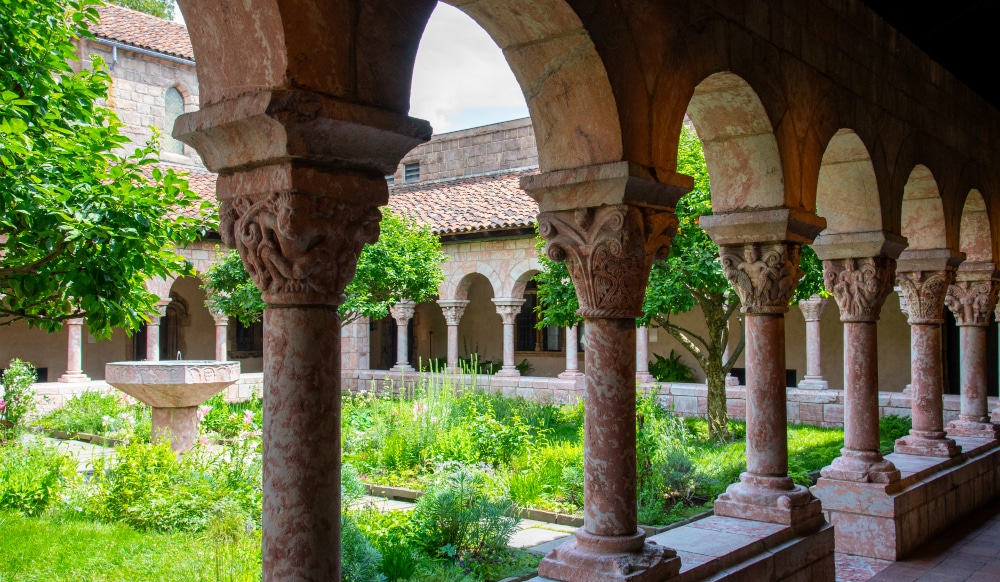
This is an example of a….
Cloister:
a covered walk, open gallery, or open arcade running along the walls of buildings and forming a quadrangle or garth
a covered walk, open gallery, or open arcade running along the walls of buildings and forming a quadrangle or garth
52
New cards
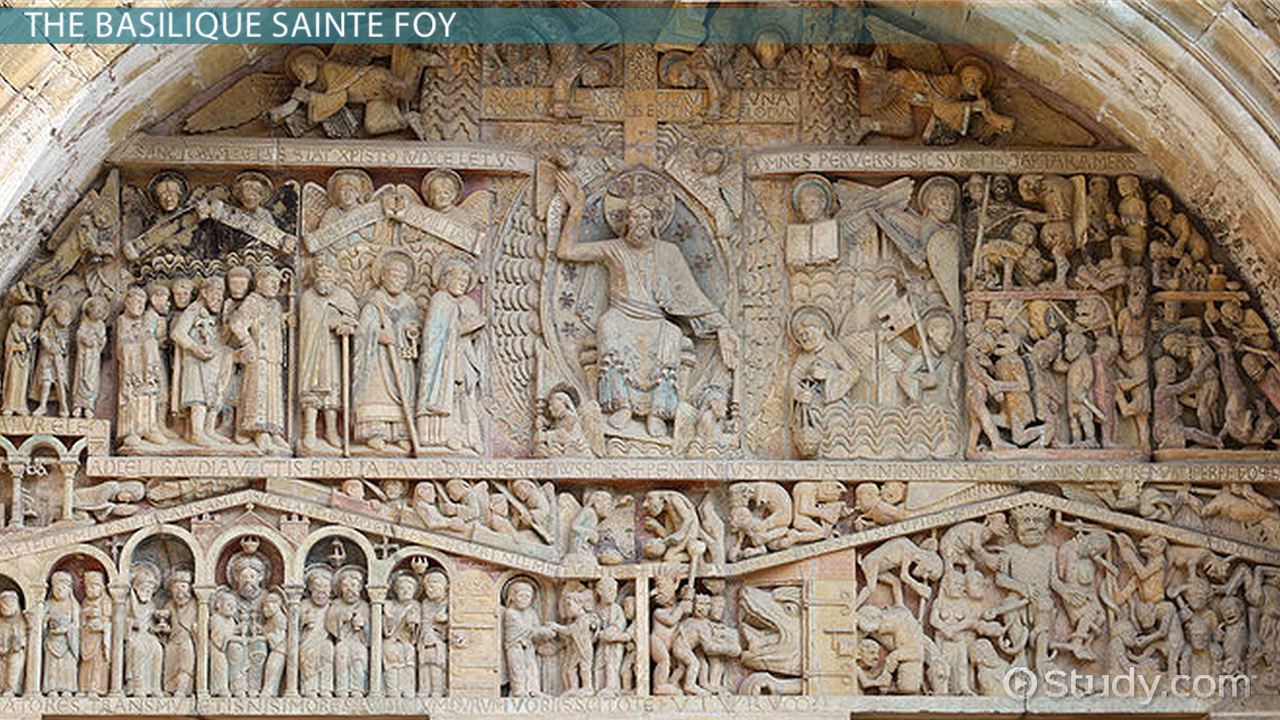
This is an example of a….
Tympanum:
the semi-circular or triangular decorative wall surface over an entrance, door or window, which is bounded by a lintel and an arch.
the semi-circular or triangular decorative wall surface over an entrance, door or window, which is bounded by a lintel and an arch.
53
New cards
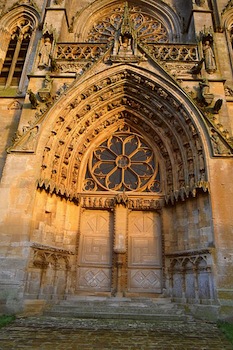
This is an example of an….
Archivolt:
a band of __molding__, __resembling__ an __architrave__, around the lower curve of an arch.
a band of __molding__, __resembling__ an __architrave__, around the lower curve of an arch.
54
New cards
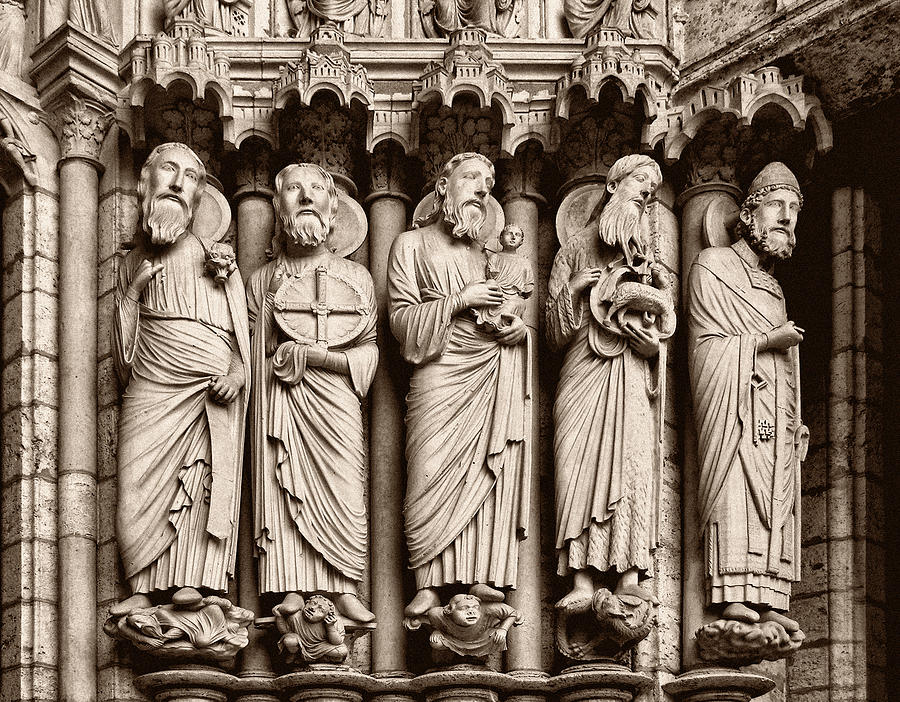
This is an example of a….
Jamb:
a vertical element of a doorway or window frame
a vertical element of a doorway or window frame
55
New cards
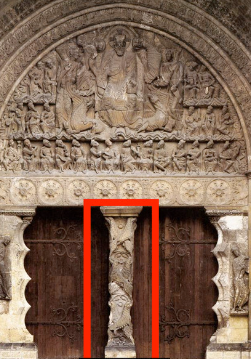
This is an example of a….
Trumeau:
a section of wall or a __pillar__ between two openings, especially a pillar __dividing__ a large __doorway__ in a church.
a section of wall or a __pillar__ between two openings, especially a pillar __dividing__ a large __doorway__ in a church.
56
New cards
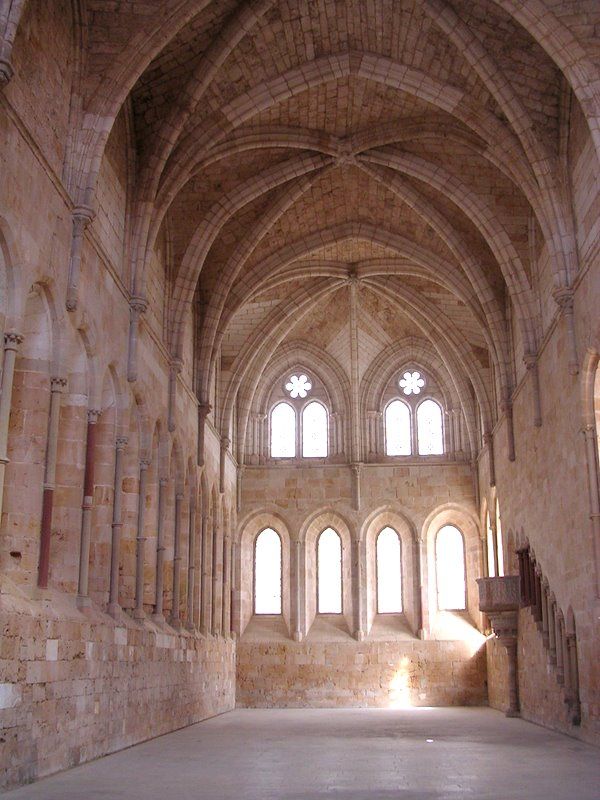
This is an example of a….
Cistercian:
Cistercian churches were built on a Romanesque plan that embellished, with vaulting and a multiplication of parts, that of the Early Christian basilica (longitudinal with side aisles, a raised nave, or centre aisle, and an apse, or semicircular projection of the wall, at the eastern, sanctuary end of the nave). No decoration.
Cistercian churches were built on a Romanesque plan that embellished, with vaulting and a multiplication of parts, that of the Early Christian basilica (longitudinal with side aisles, a raised nave, or centre aisle, and an apse, or semicircular projection of the wall, at the eastern, sanctuary end of the nave). No decoration.
57
New cards
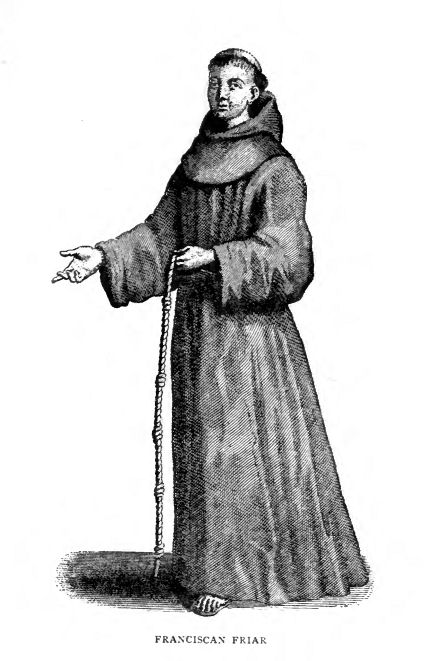
This is an example of a….
Franciscan:
a group of related mendicant Christian religious orders within the Catholic Church
a group of related mendicant Christian religious orders within the Catholic Church
58
New cards
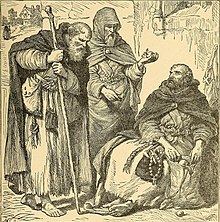
This is an example of a….
Mendicant:
member of any of several Roman Catholic religious orders who assumes a vow of poverty and supports himself or herself by work and charitable contributions (a beggar)
member of any of several Roman Catholic religious orders who assumes a vow of poverty and supports himself or herself by work and charitable contributions (a beggar)
59
New cards
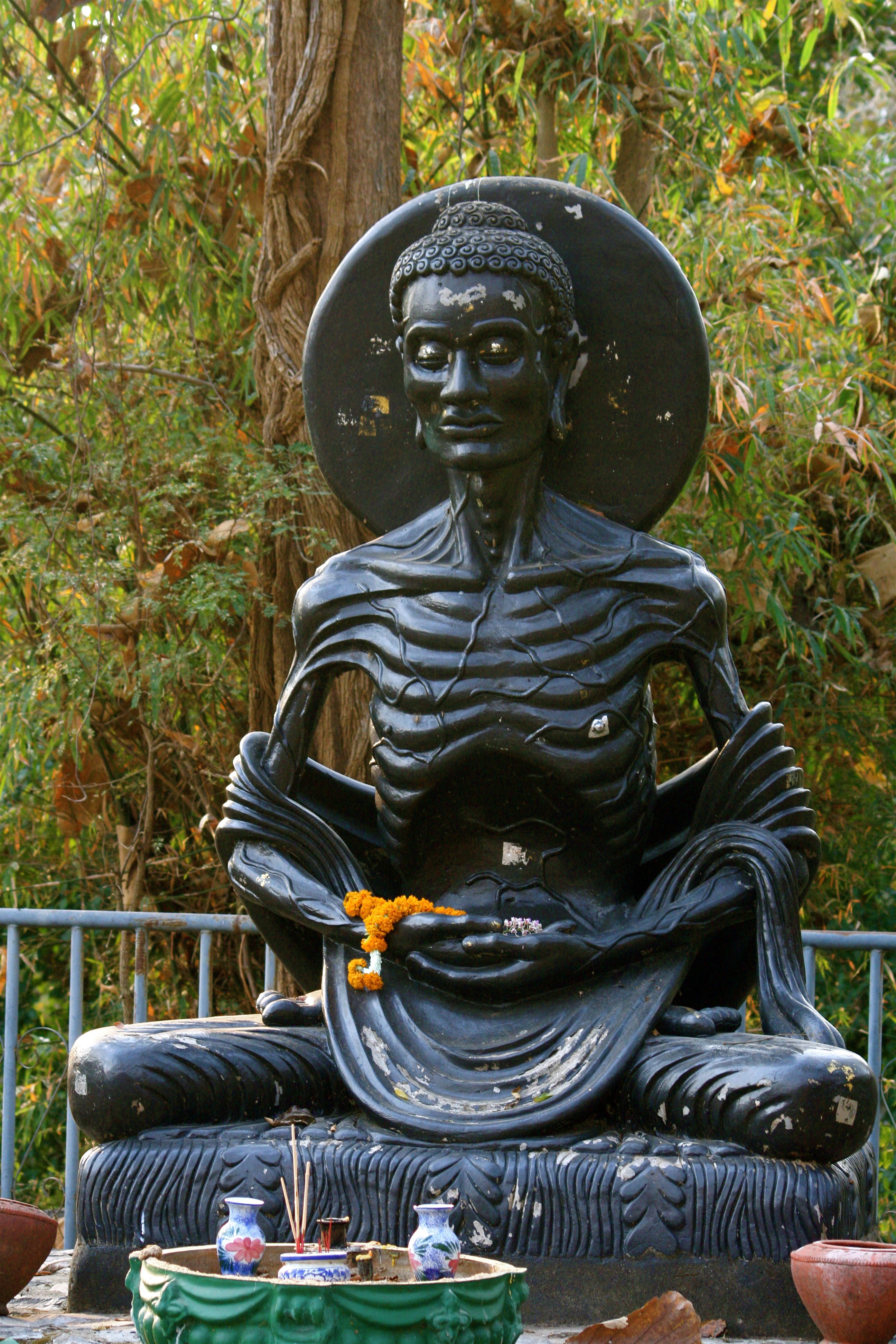
This is an example of an….
Ascetic:
abstinence from sensual pleasures, often for the purpose of pursuing spiritual goals
abstinence from sensual pleasures, often for the purpose of pursuing spiritual goals
60
New cards
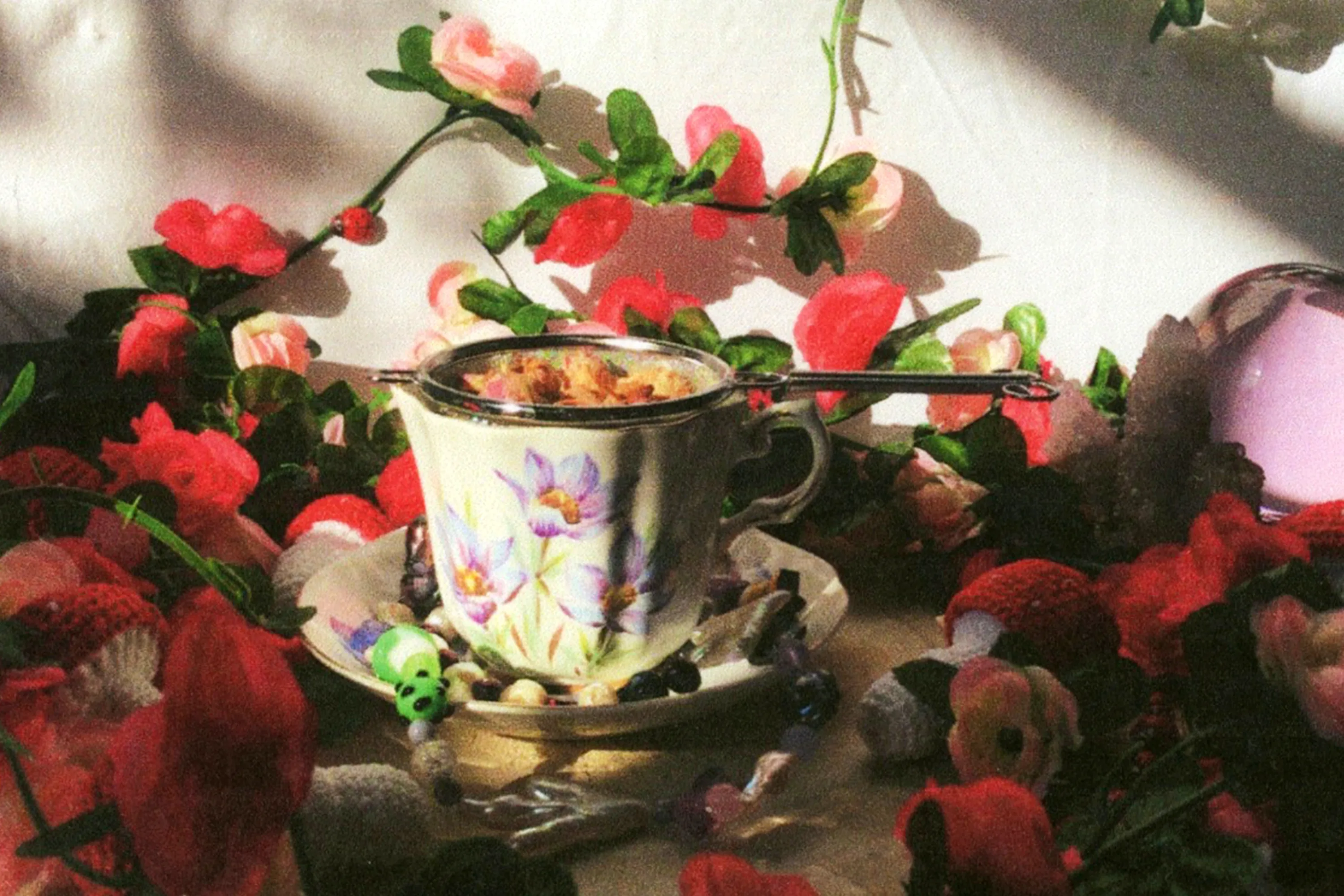
This is an example of an….
Aesthetic:
concerned with beauty or the appreciation of beauty
concerned with beauty or the appreciation of beauty
61
New cards
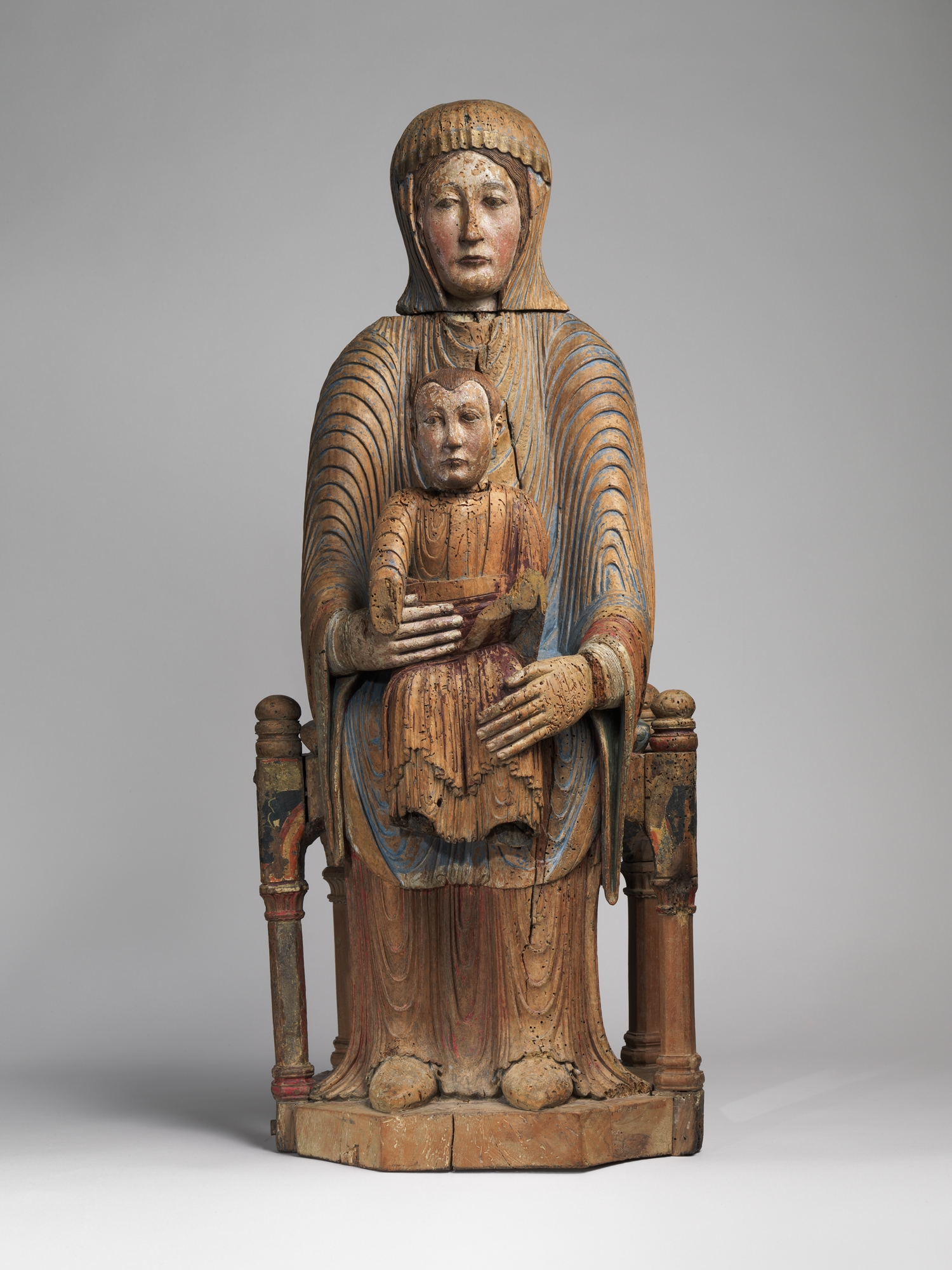
This is an example of a….
Sedes Sapientiae/Throne of Wisdom:
presents Mary as the bearer of God via her role as the mother of Christ, transforming Mary into an actual throne for Christ
presents Mary as the bearer of God via her role as the mother of Christ, transforming Mary into an actual throne for Christ
62
New cards
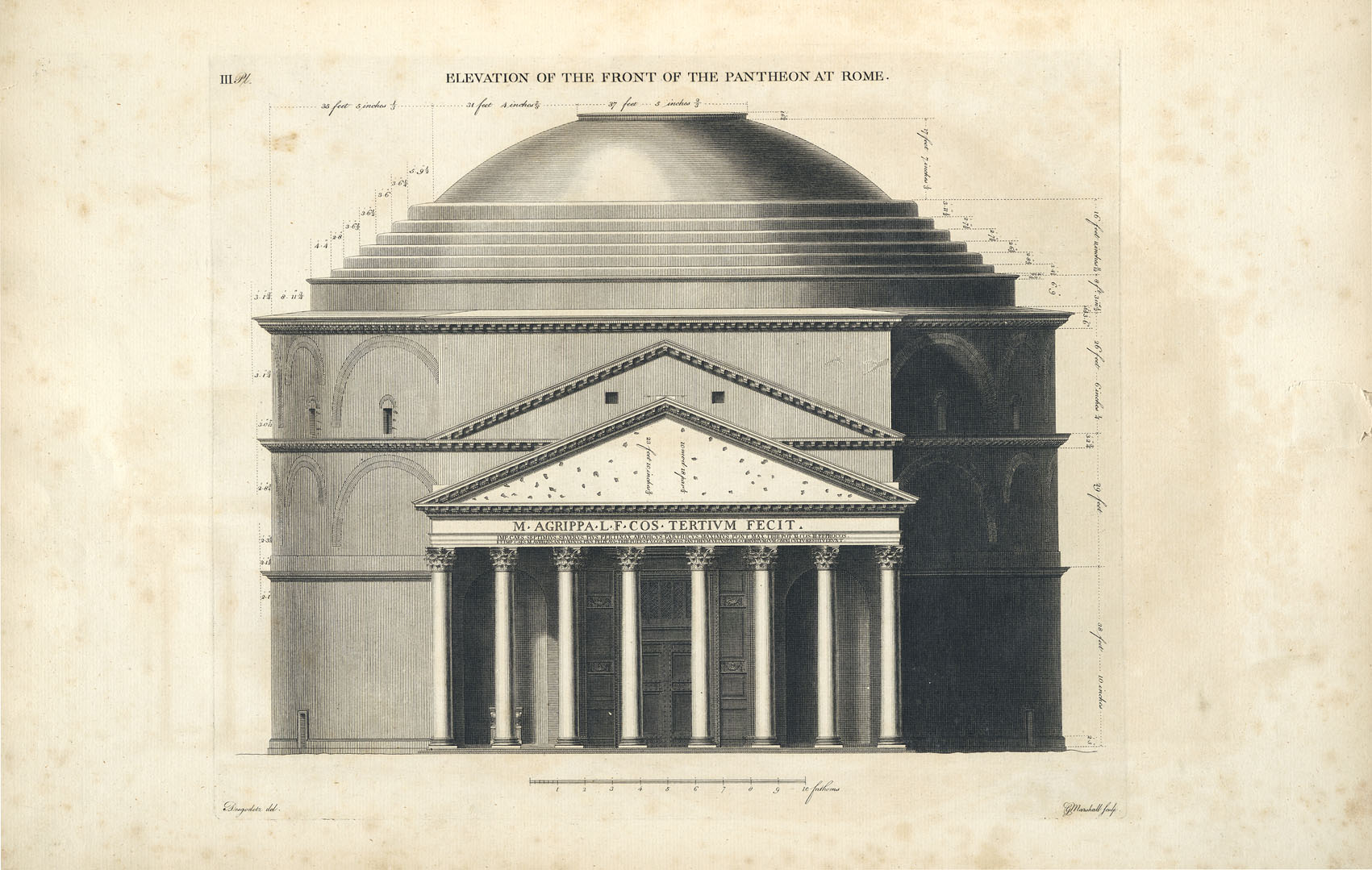
This is an example of….
Elevation:
a geometric projection of a building, or other object, on a plane perpendicular to the horizon
a geometric projection of a building, or other object, on a plane perpendicular to the horizon
63
New cards
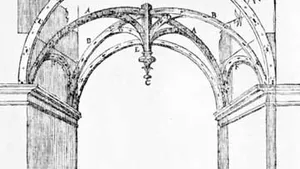
This is an example of a….
Bay:
any division of a building between vertical lines or planes, especially the entire space included between two adjacent supports; thus, the space between two columns, or pilasters, or from pier to pier in a church, including that part of the vaulting or ceiling between them
any division of a building between vertical lines or planes, especially the entire space included between two adjacent supports; thus, the space between two columns, or pilasters, or from pier to pier in a church, including that part of the vaulting or ceiling between them
64
New cards
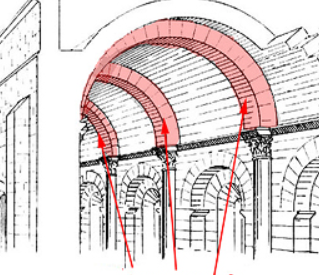
This is an example of a….
Transverse arch:
Supporting arch which runs across the vault from side to side, dividing the bays. it usually projects down from the surface of the vault
Supporting arch which runs across the vault from side to side, dividing the bays. it usually projects down from the surface of the vault
65
New cards
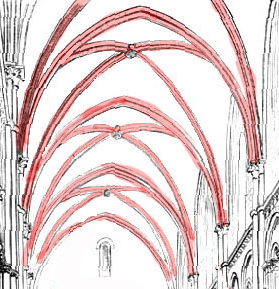
This is an example of a….
Rib vault:
a skeleton of arches or ribs on which masonry can be laid to form a ceiling or roof
a skeleton of arches or ribs on which masonry can be laid to form a ceiling or roof
66
New cards
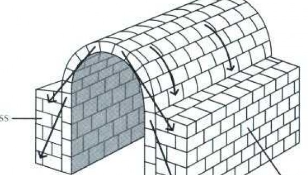
This is an example of a….
Barrel vault:
a series of arches placed one after another to create a tunnel
a series of arches placed one after another to create a tunnel
67
New cards
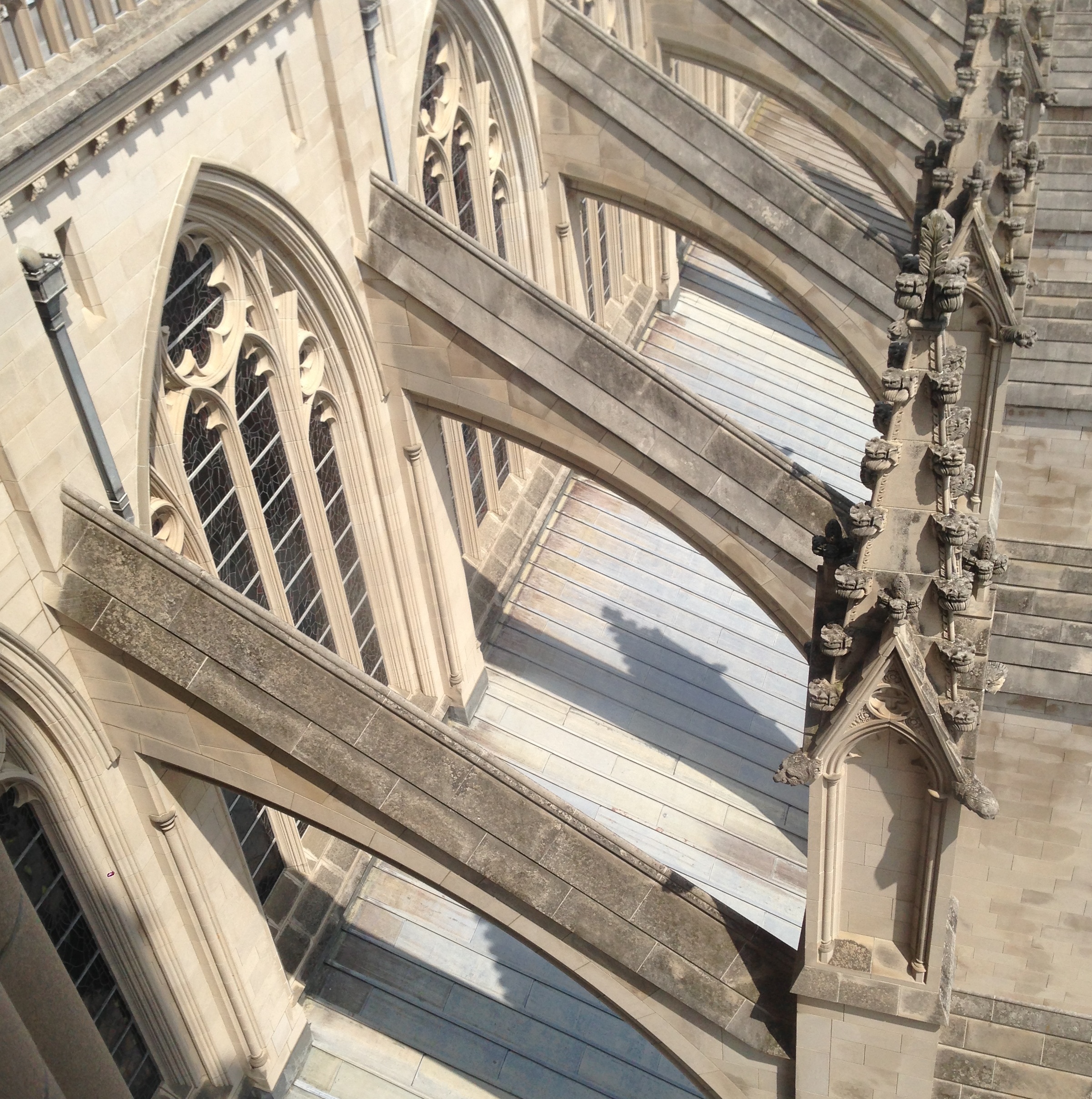
This is an example of a….
Flying buttress:
consisting of an inclined bar carried on a half arch that extends (“flies”) from the upper part of a wall to a pier some distance away and carries the thrust of a roof or vault.
consisting of an inclined bar carried on a half arch that extends (“flies”) from the upper part of a wall to a pier some distance away and carries the thrust of a roof or vault.
68
New cards
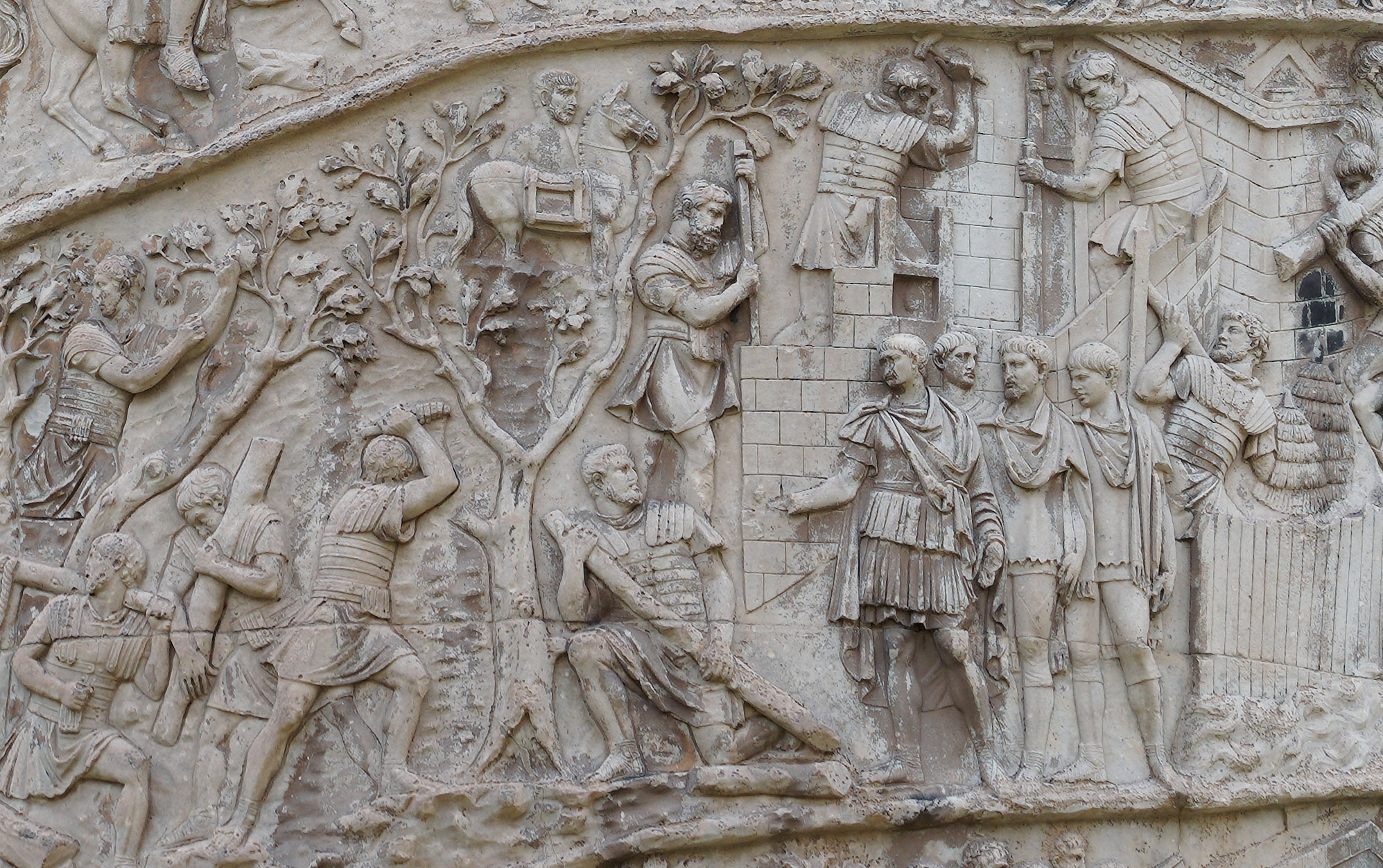
This is an example of a….??
Continuous narrative:
a type of narrative that illustrates multiple scenes of a narrative within a single frame
a type of narrative that illustrates multiple scenes of a narrative within a single frame
69
New cards
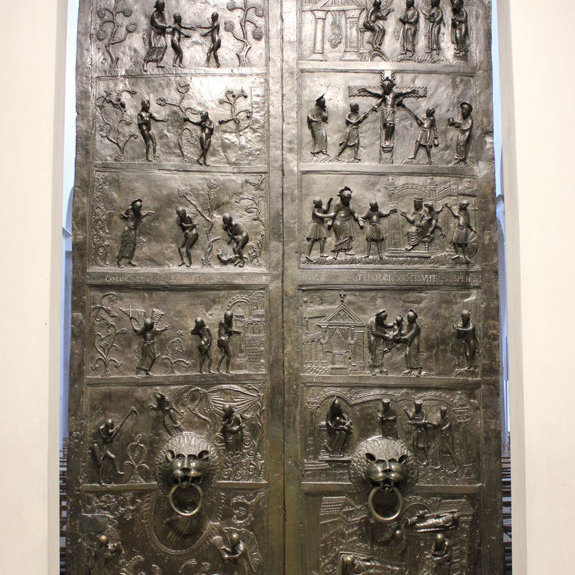
This is an example of a….??
Sequential narrative:
juxtaposed images bound by meaningful connections. Convey a continuous event sequence, typically to tell a story,
juxtaposed images bound by meaningful connections. Convey a continuous event sequence, typically to tell a story,
70
New cards
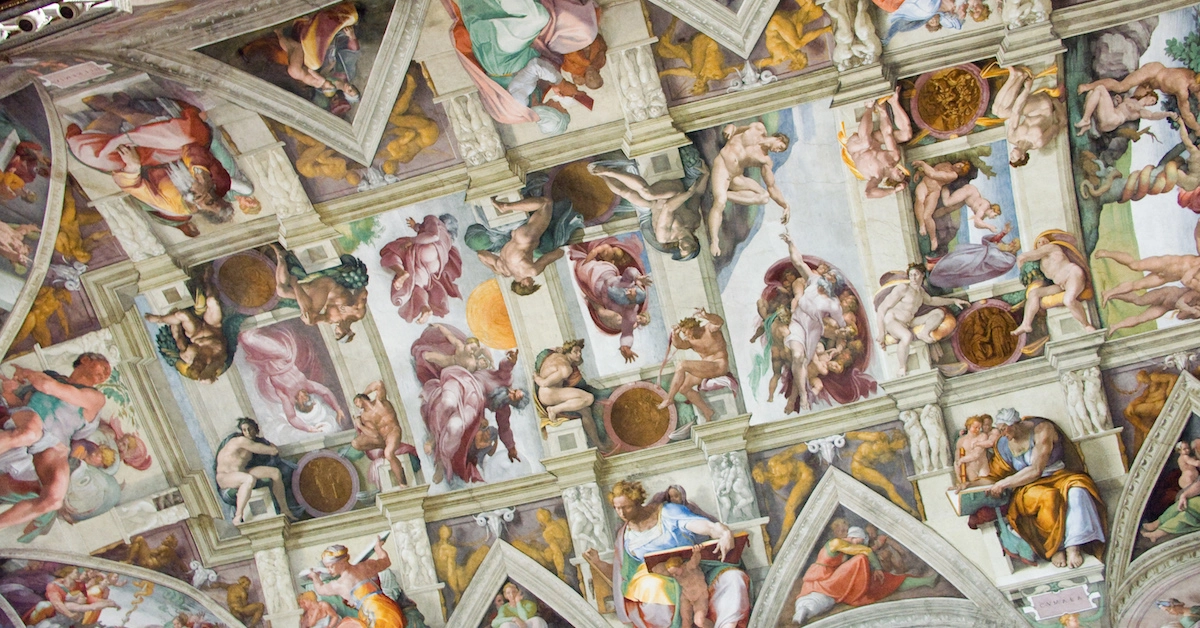
This is an example of a….
Fresco:
a mural painting technique that involves painting with water-based paint directly onto wet plaster so that the paint becomes an integral part of the plaster. (on the wall)
a mural painting technique that involves painting with water-based paint directly onto wet plaster so that the paint becomes an integral part of the plaster. (on the wall)
71
New cards
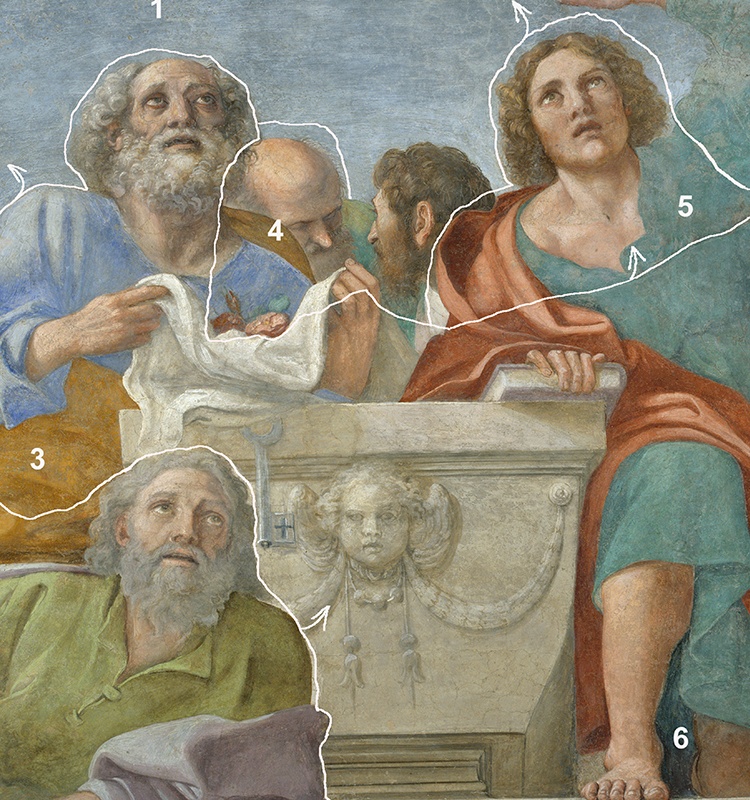
This is an example of a….
Giornata:
an art term, originating from an Italian word which means "a day's work." The term is used in Buon fresco mural painting and describes how much painting can be done in a single day of work.
an art term, originating from an Italian word which means "a day's work." The term is used in Buon fresco mural painting and describes how much painting can be done in a single day of work.
72
New cards
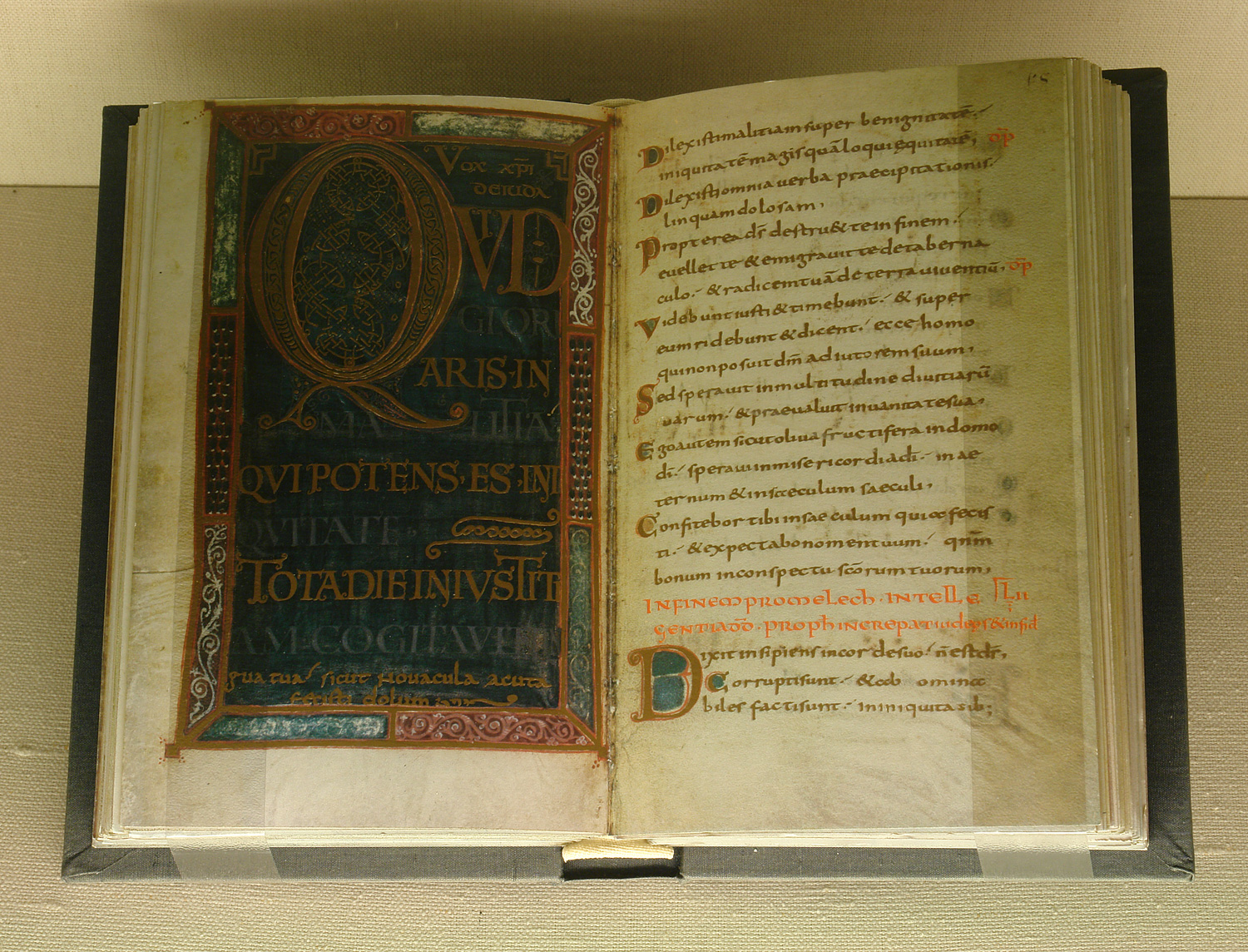
This is an example of a….
Psalter:
a copy of the __biblical__ Psalms
a copy of the __biblical__ Psalms
73
New cards
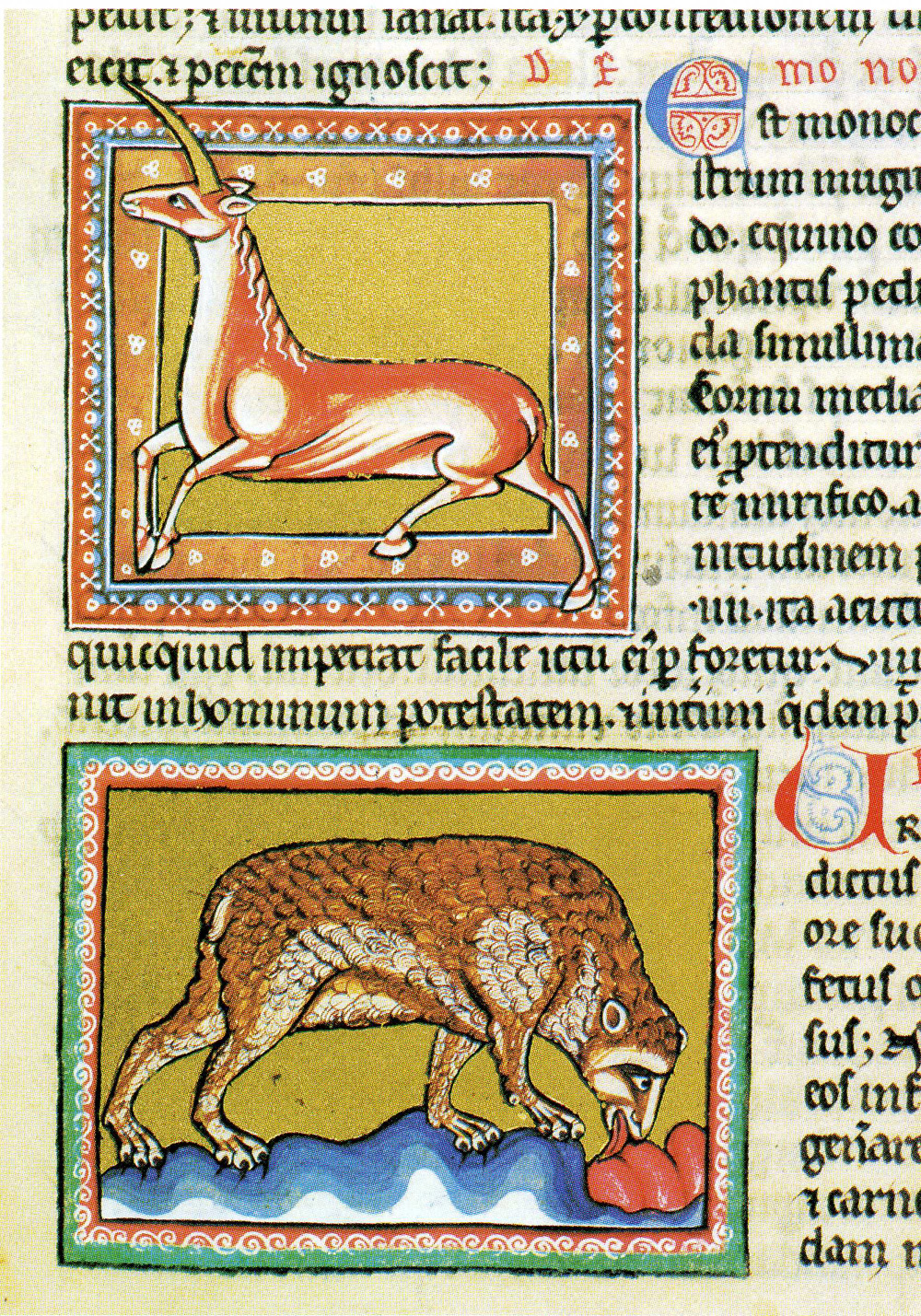
This is an example of a….
Bestiary:
a descriptive or __anecdotal__ __treatise__ on various real or mythical kinds of animals, especially a medieval work with a __moralizing__ tone.
a descriptive or __anecdotal__ __treatise__ on various real or mythical kinds of animals, especially a medieval work with a __moralizing__ tone.
74
New cards
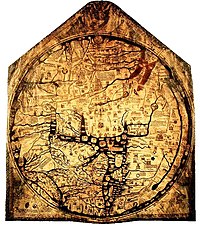
This is an example of a….
T-O map:
Medieval geography divided the world into three schematic parts: Asia, Europe, and Africa. Asia was depicted on top as the birthplace of Christ and the original site of the Garden of Eden.
Medieval geography divided the world into three schematic parts: Asia, Europe, and Africa. Asia was depicted on top as the birthplace of Christ and the original site of the Garden of Eden.
75
New cards
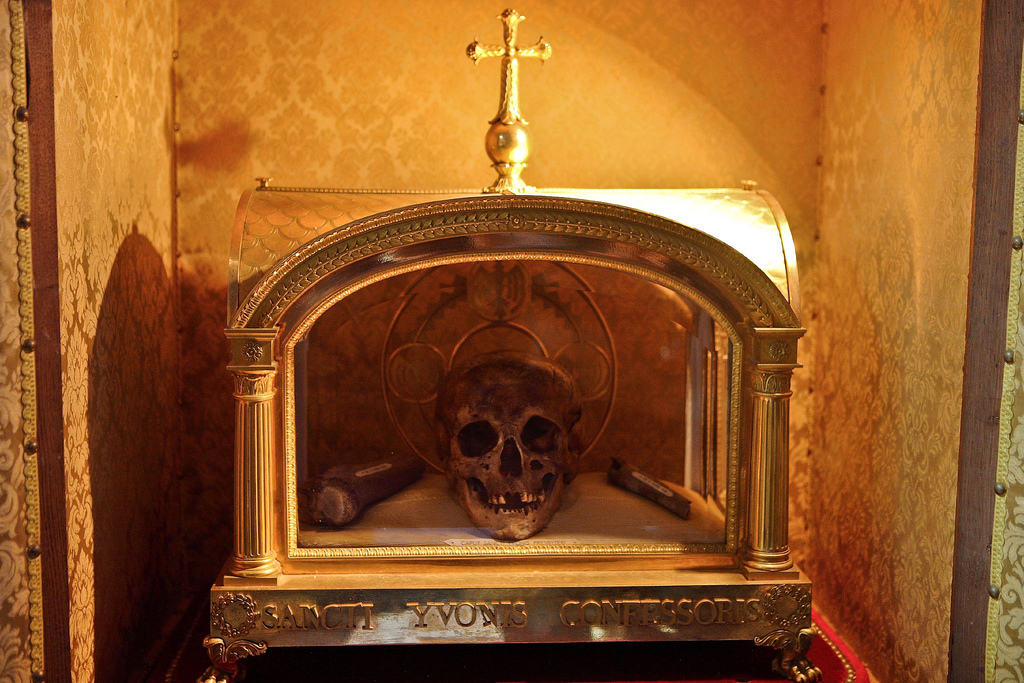
This is an example of a….
Relic:
a body part or object associated with a religious figure
a body part or object associated with a religious figure
76
New cards
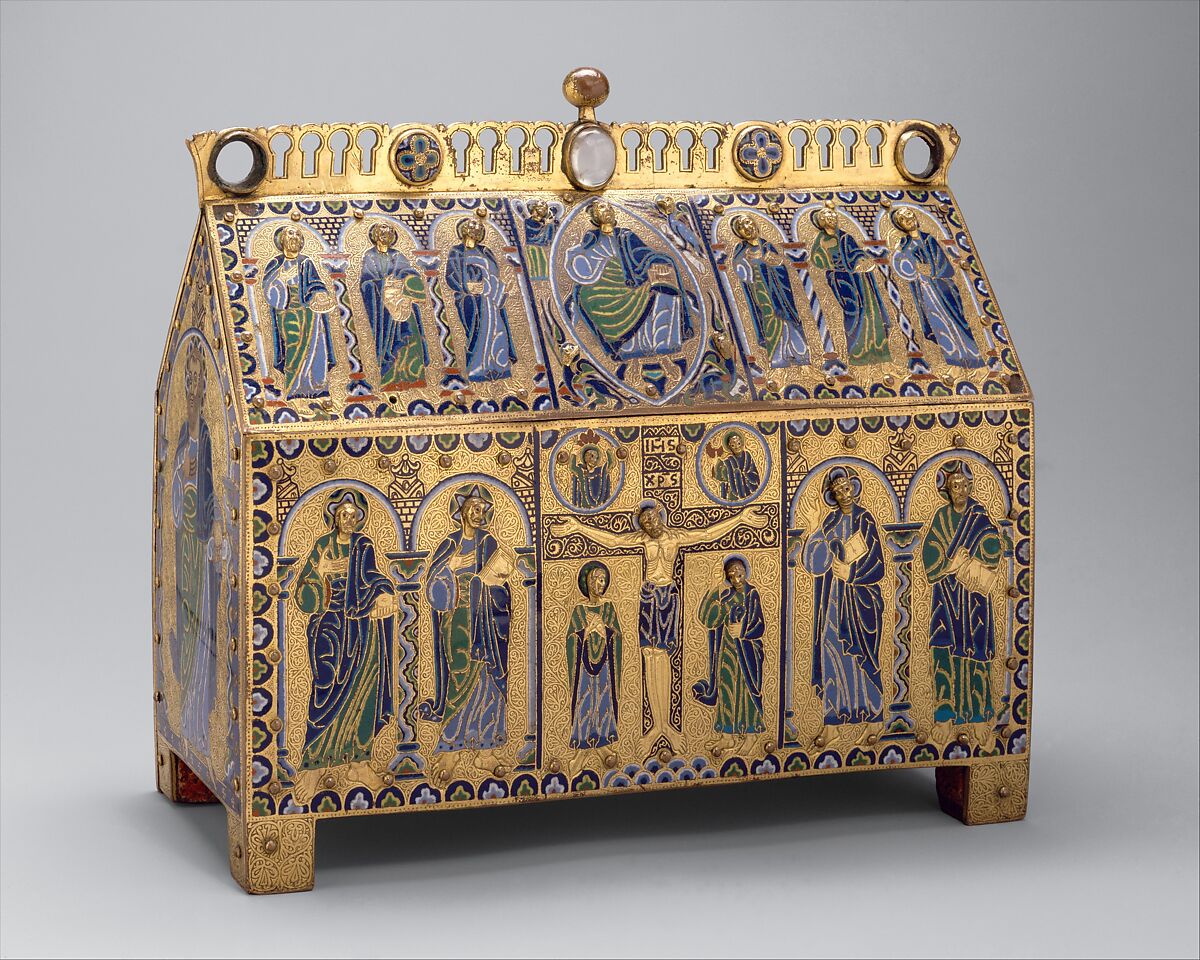
This is an example of a….
Reliquary:
a container for relics
a container for relics
77
New cards
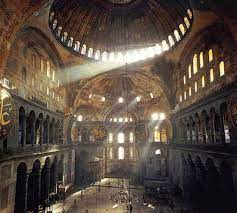
This is an example of….
Varietas:
difference, diversity, variety. providing variances among the same or similar things/objects
difference, diversity, variety. providing variances among the same or similar things/objects
78
New cards
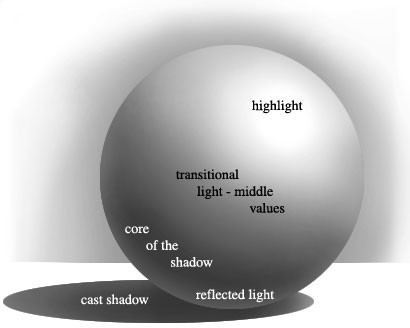
This is an example of a….??
Value modeling:
the technique of creating the illusion of three-dimensionality by the use of gradations of value (shading)????
the technique of creating the illusion of three-dimensionality by the use of gradations of value (shading)????
79
New cards
Know Themes
Cultural Exchange
Continuity and Change
Representations of Power
etc.??
Continuity and Change
Representations of Power
etc.??